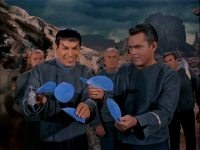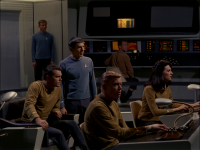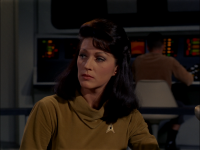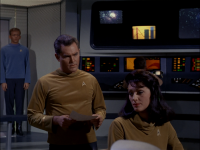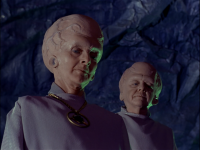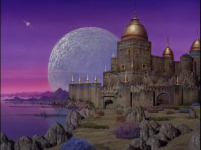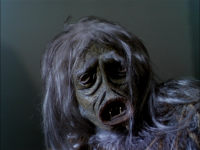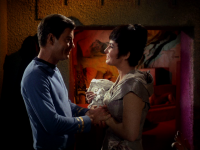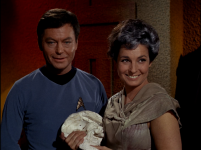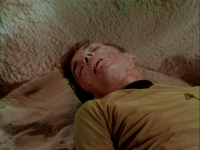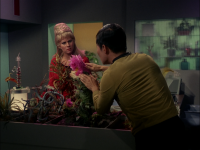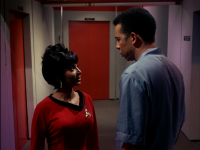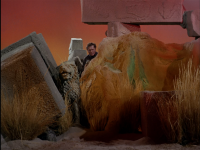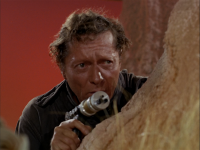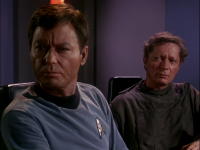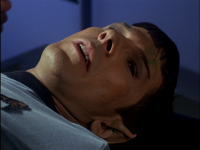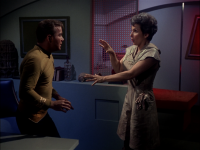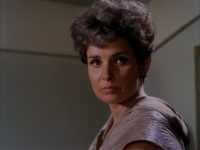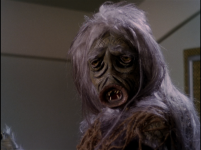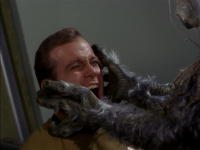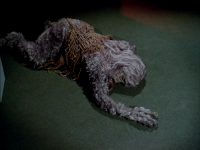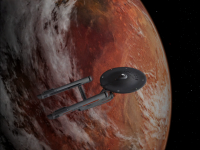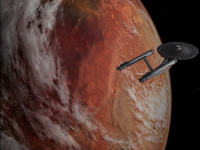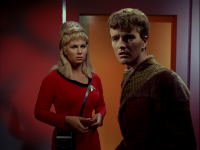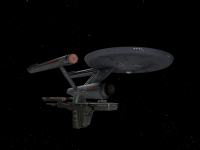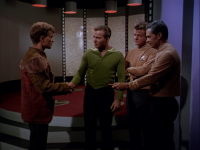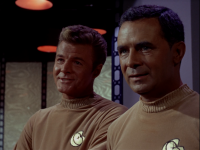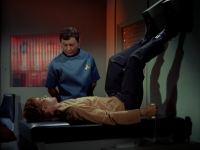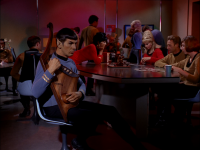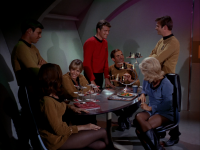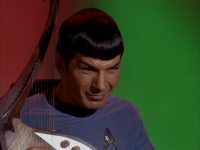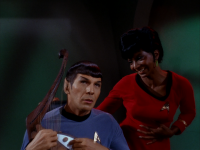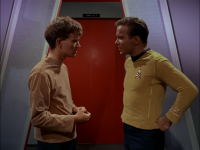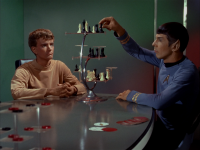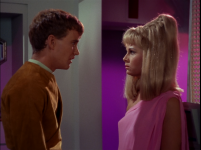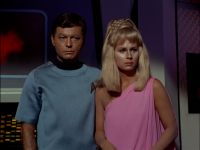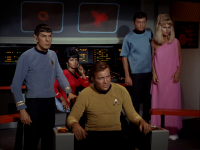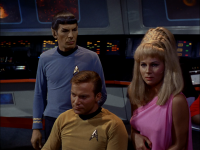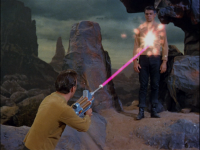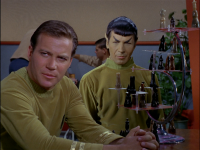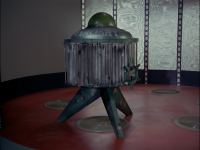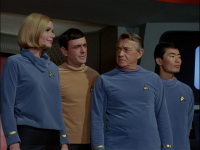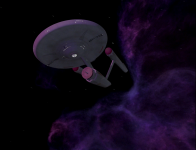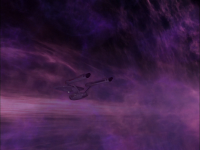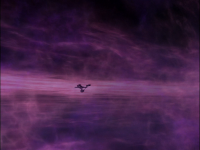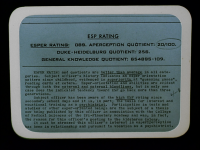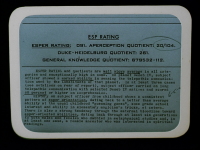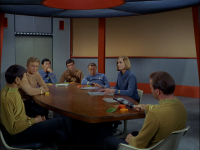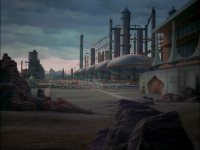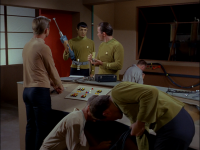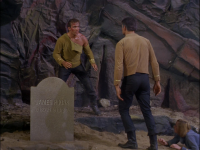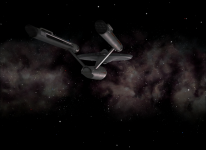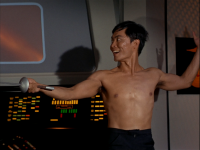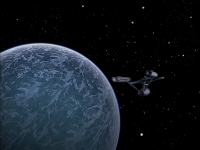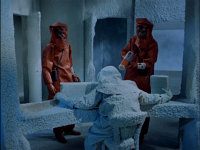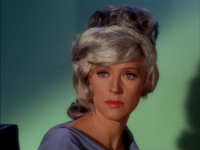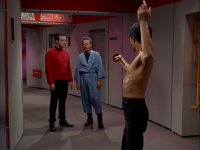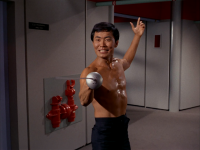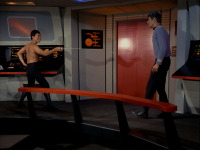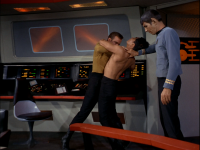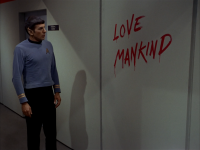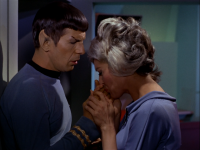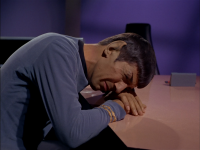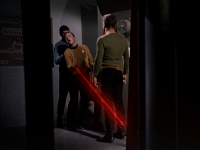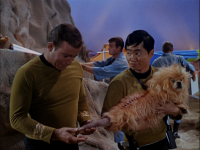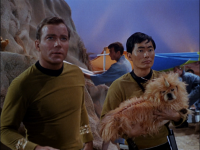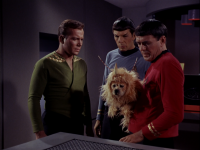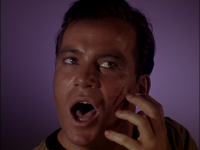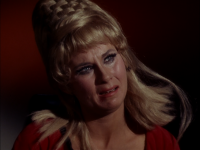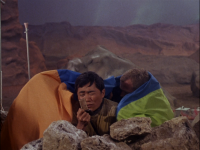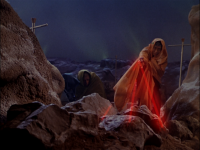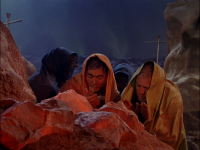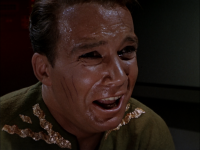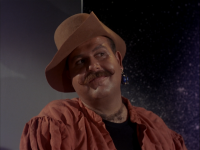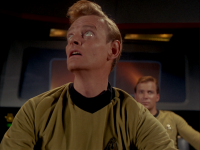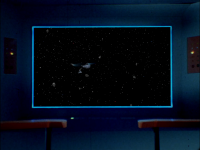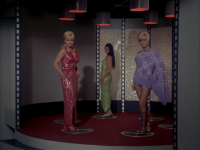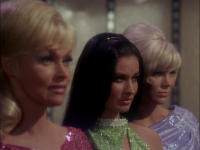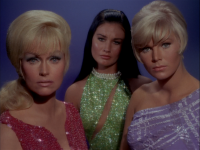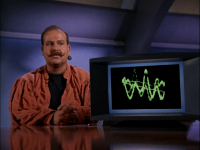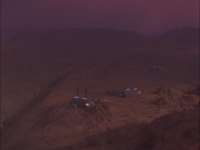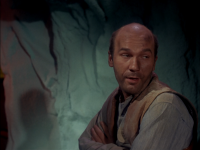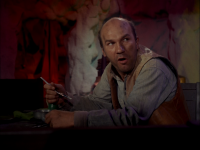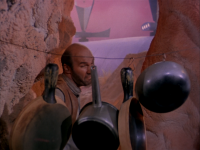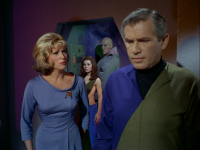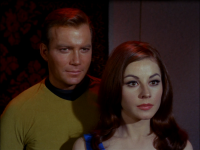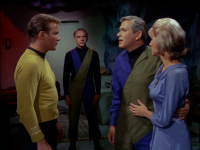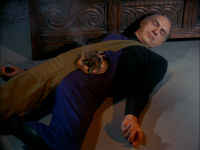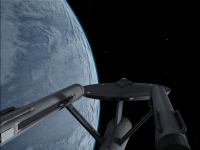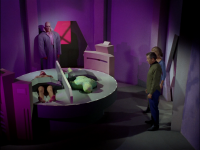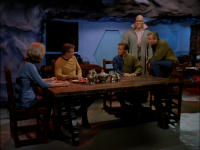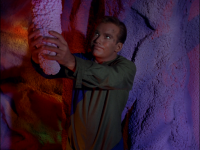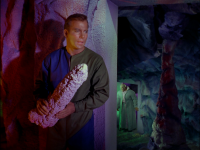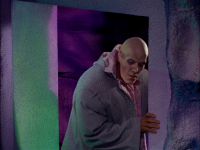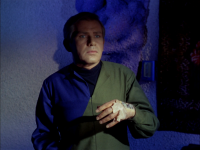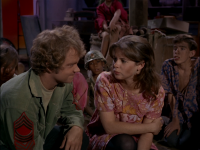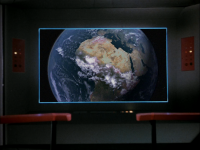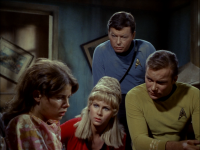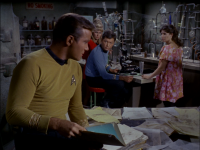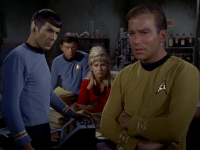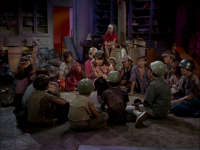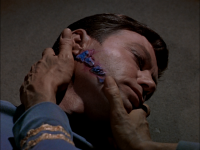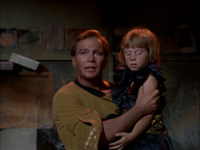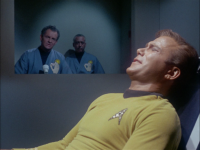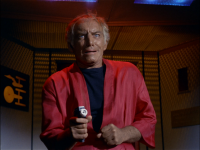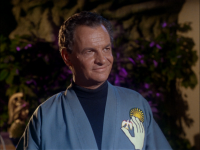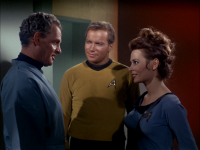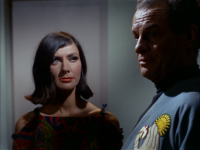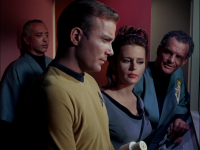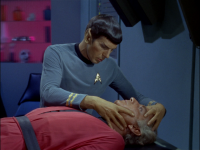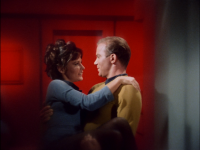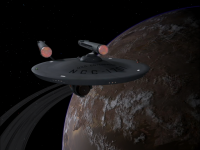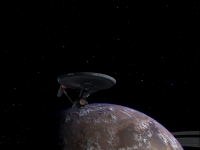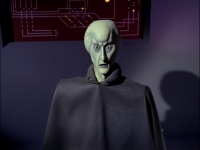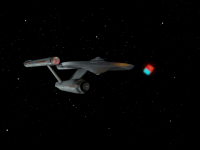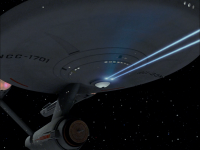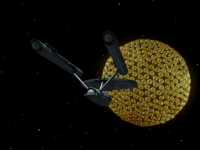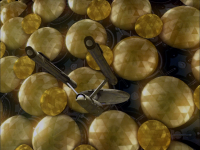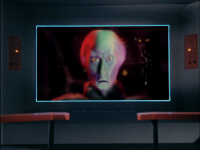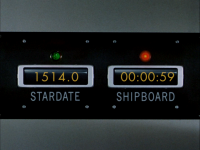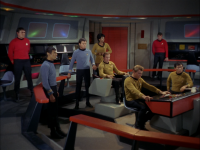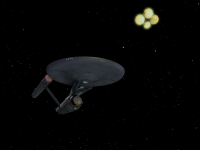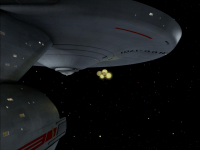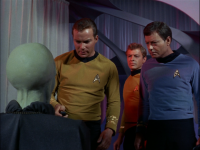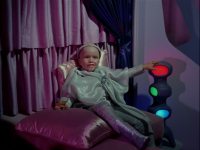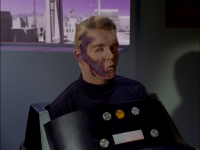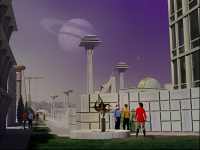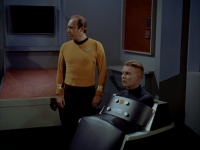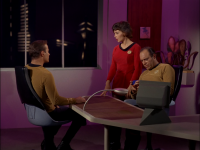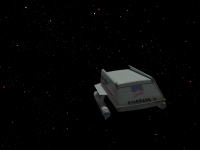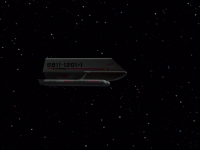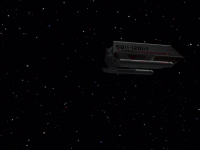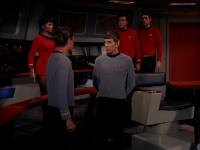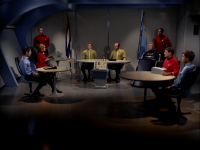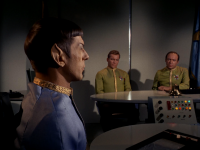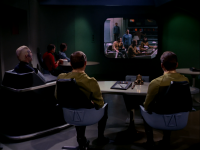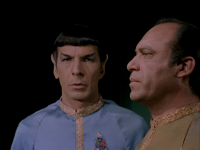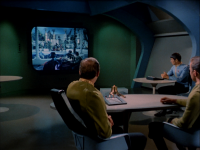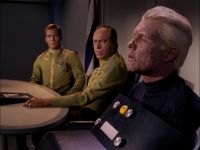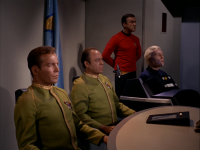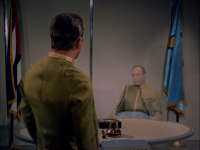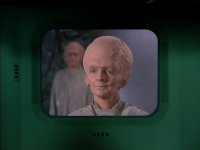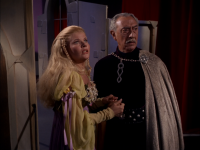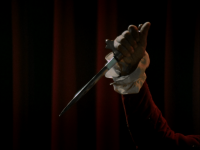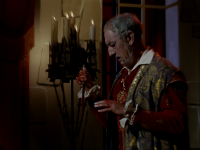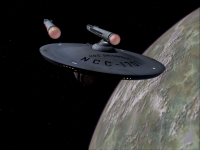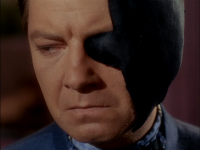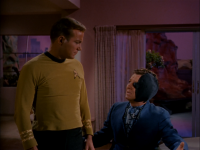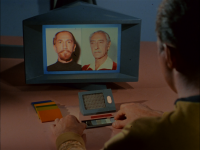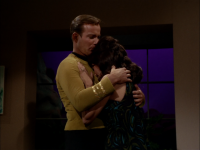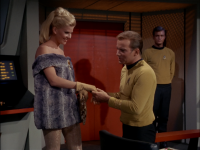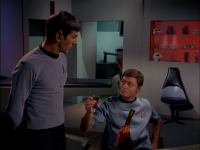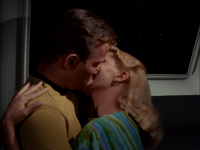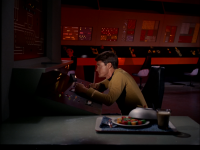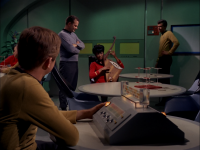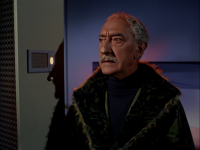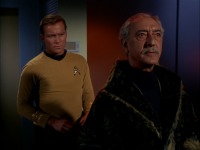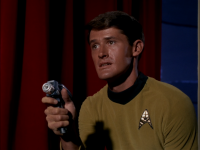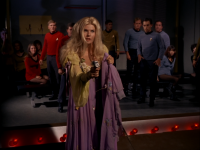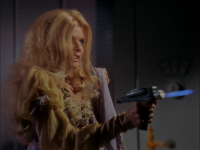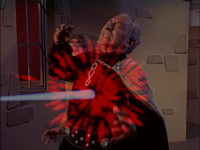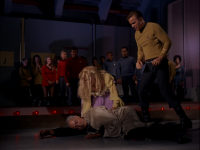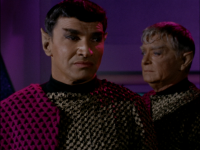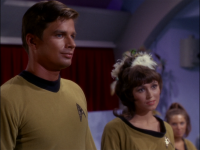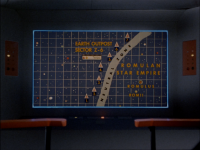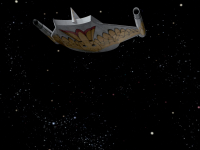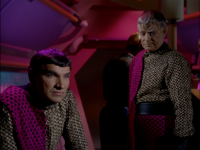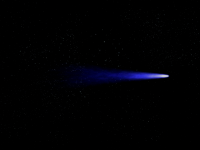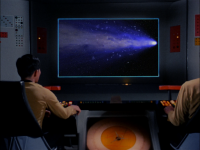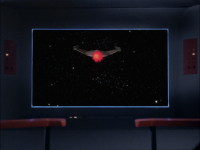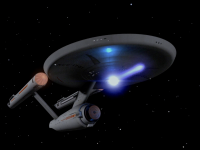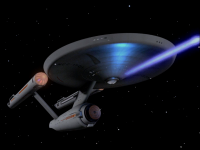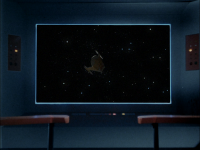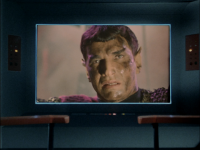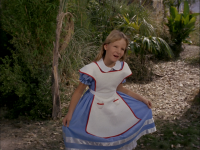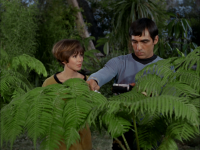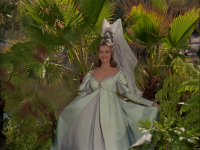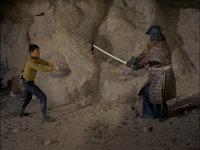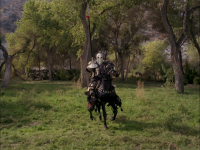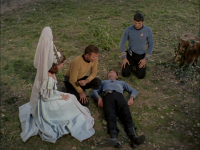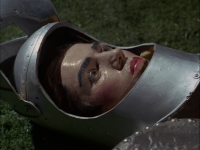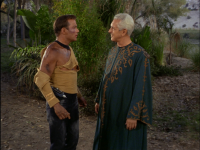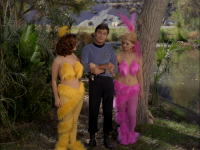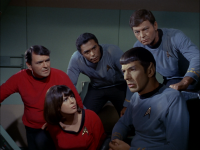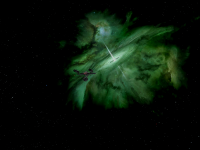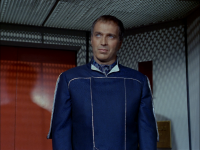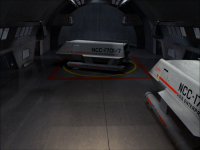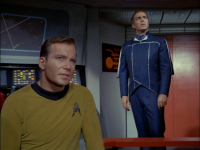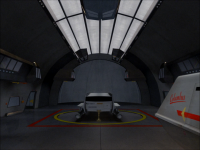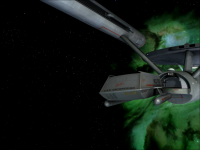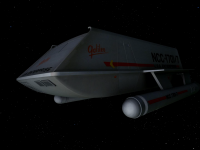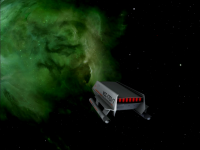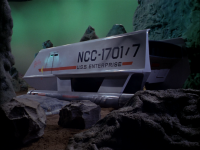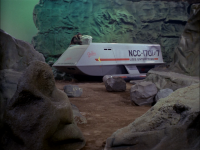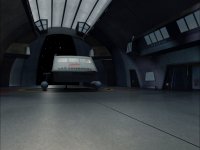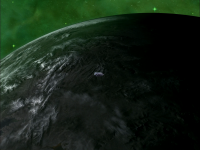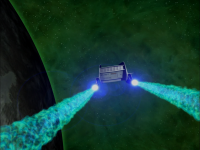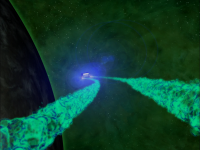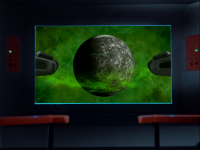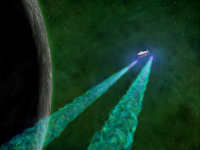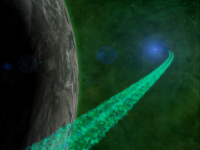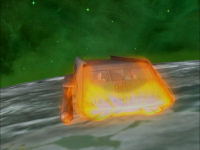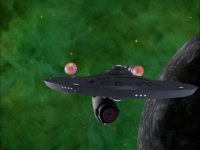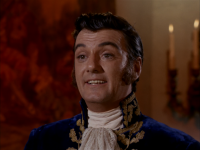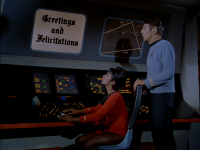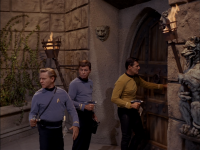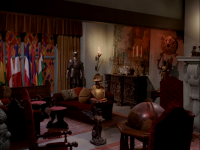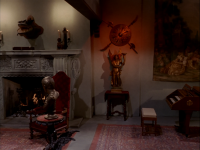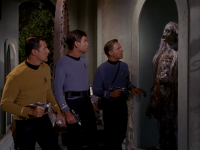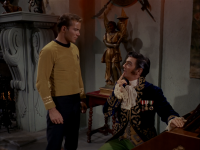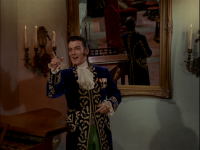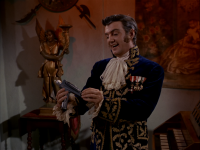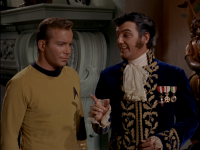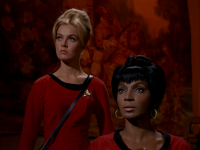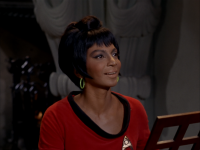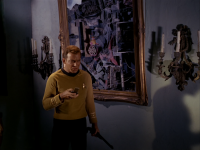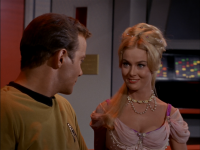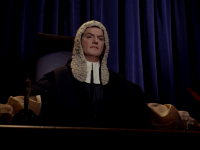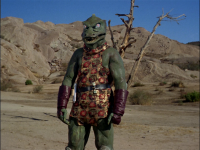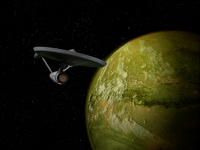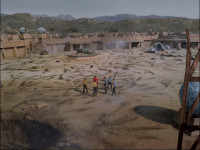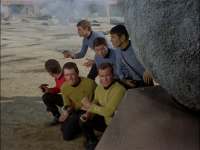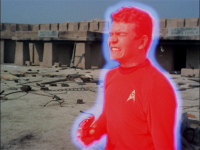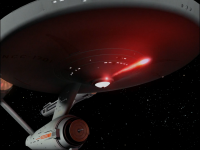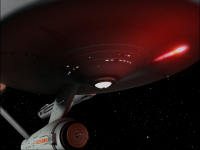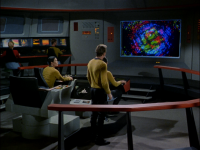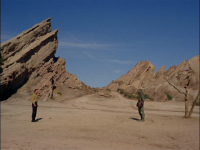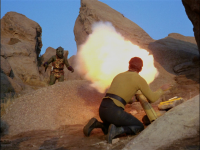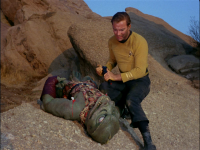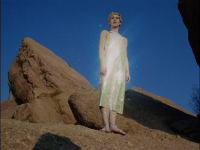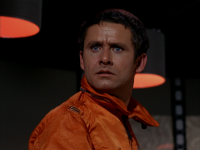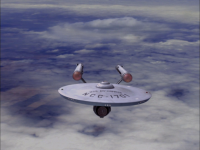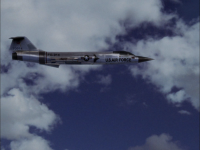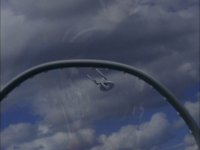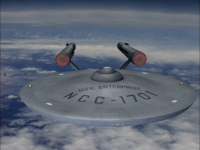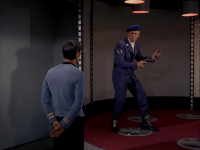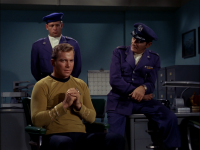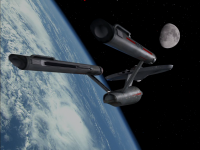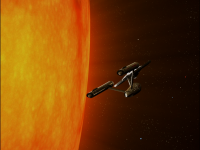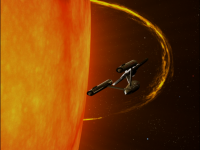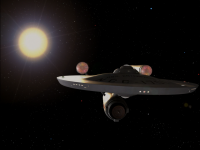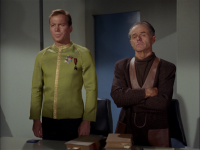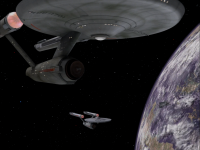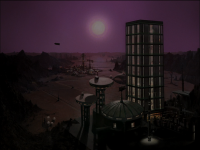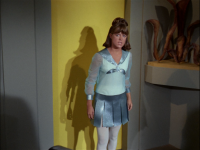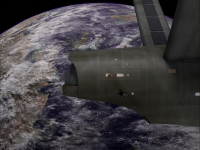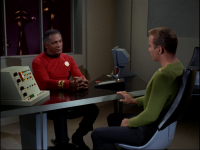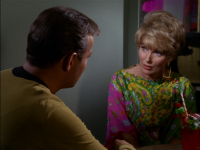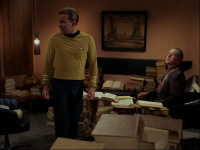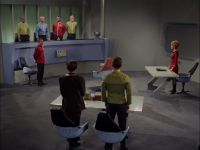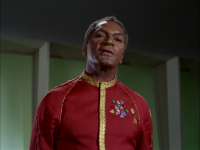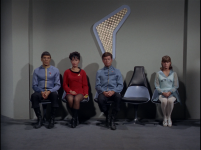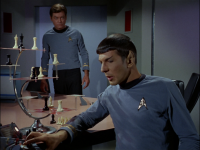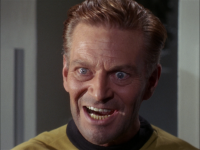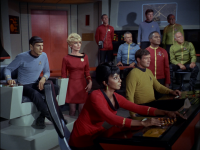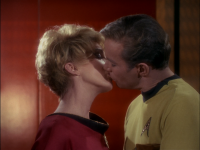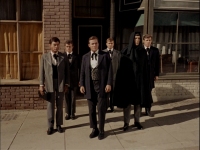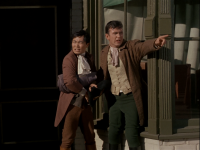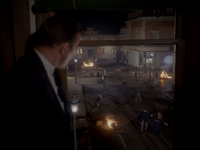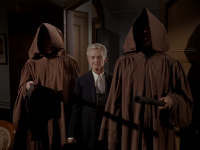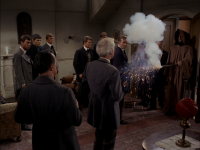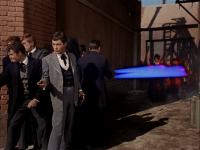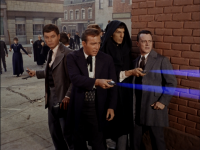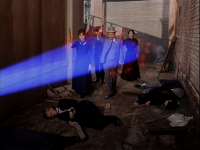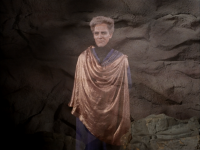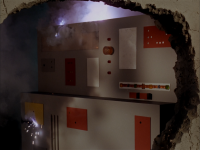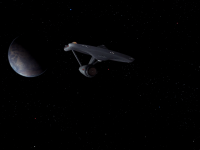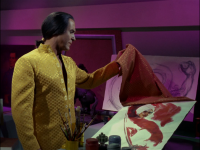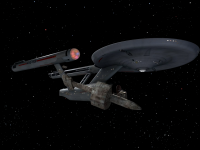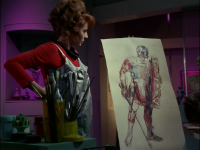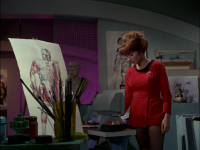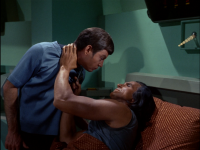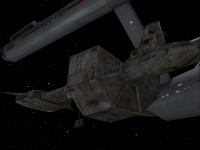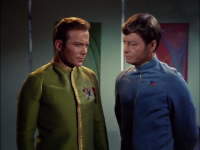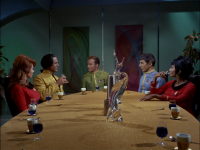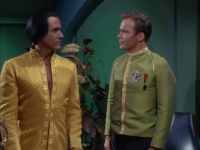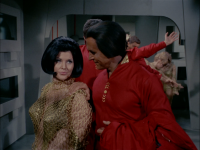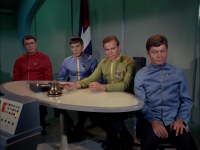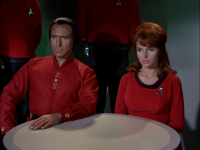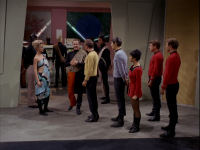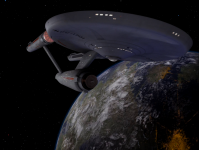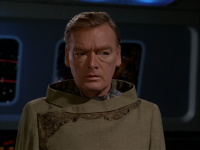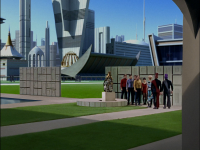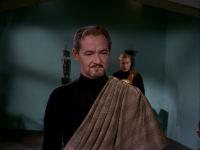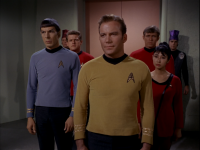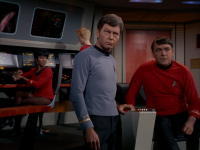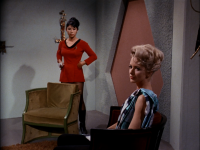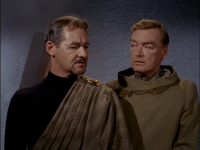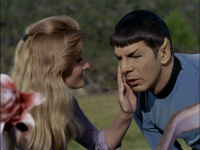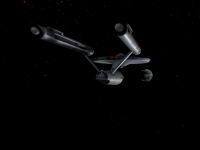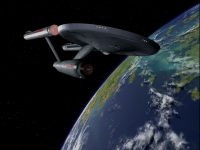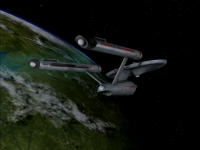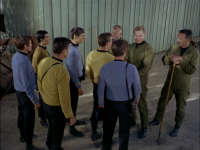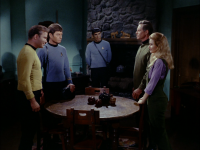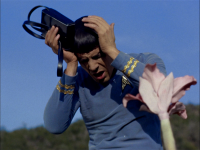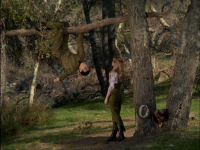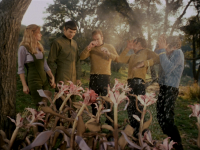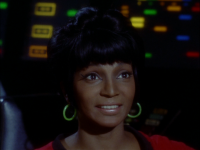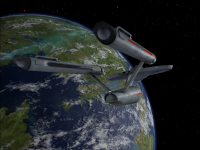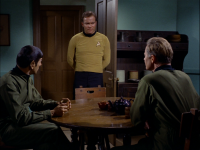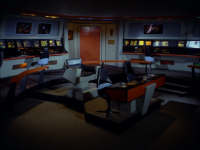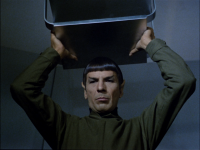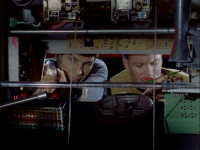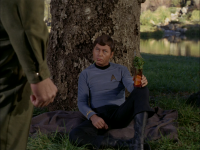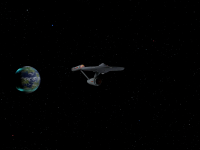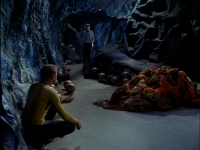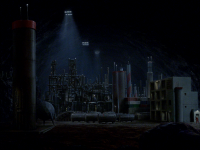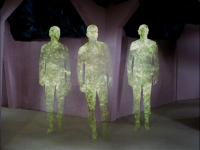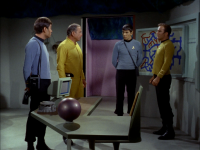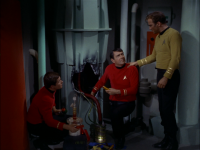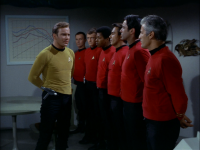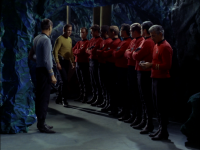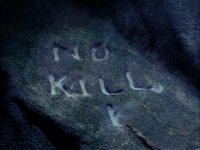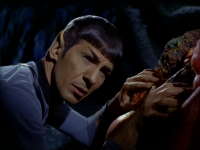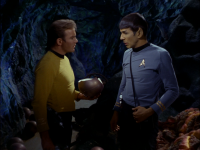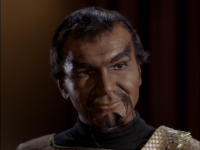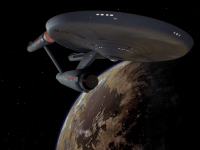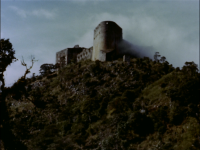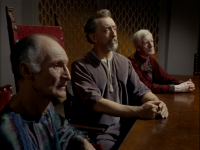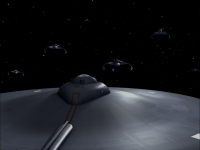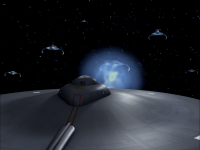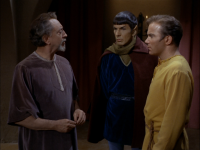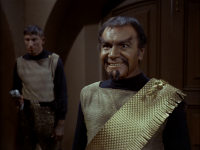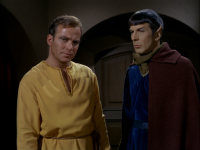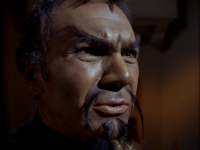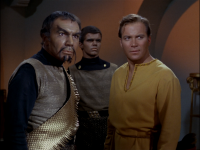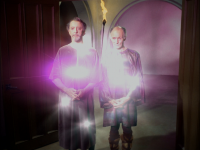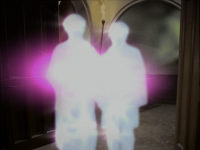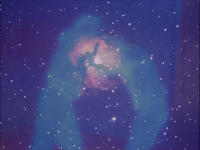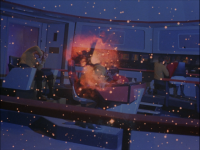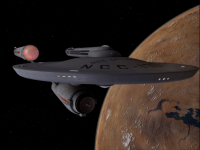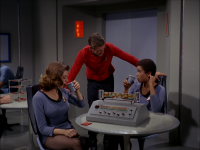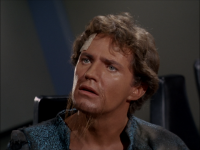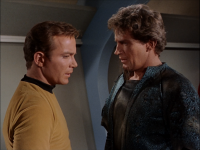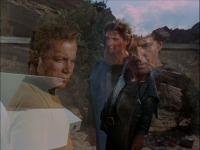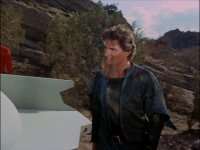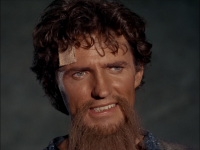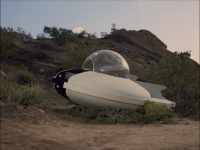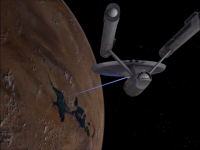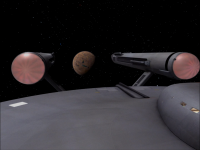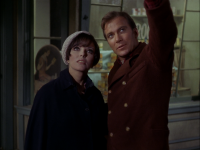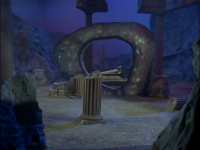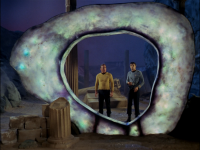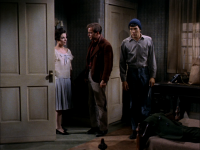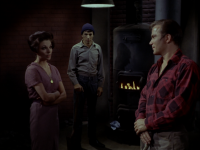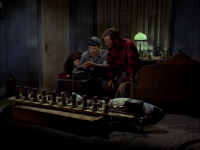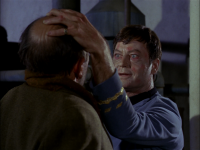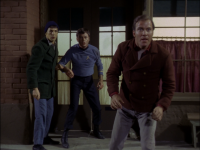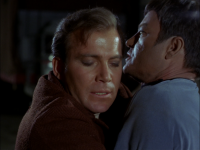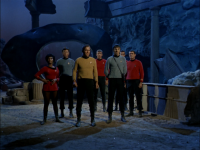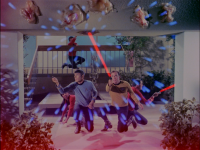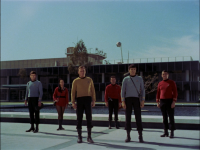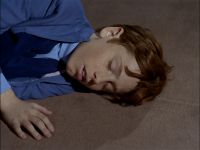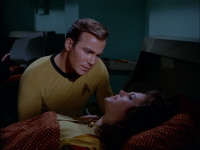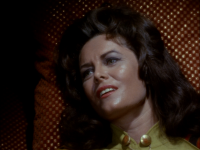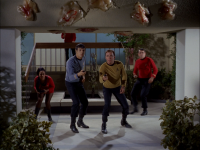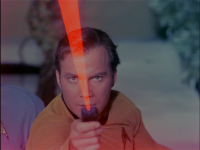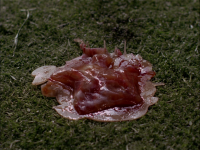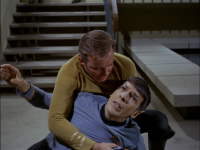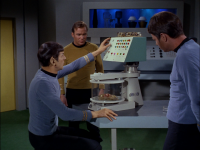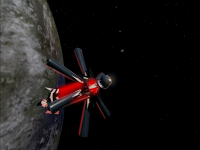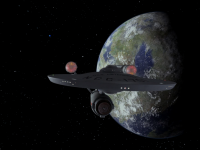Star Trek: The Original Series — 1x00 — The Cage
Synopsis
Captain Pike and his crew are lured to Talos IV by a race capable of creating powerful illusions.
Filler rating: good filler
This is the original pilot of Star Trek. It never aired until subsequent home video releases included it as an extra, but chronologically this is the first episode of Star Trek and many people believe that you should watch this episode first. However, it's worth noting that almost all of the material in this episode will be shown again in a chronologically later episode, The Menagerie, as a clip show. If you hate clip shows, then skip this episode. You'll catch all the important bits of this episode in The Menagerie's retelling of it.
Remarkable scenes
- Christopher Pike doubting his ability to command the Enterprise.
- Pike, to Number One briefly forgetting that his first officer is female: "I can't get used to having a woman on the bridge."
- The aliens belittling Pike shortly after his capture.
- Pike being transported back into the memory he bemoaned about to the doctor.
- Pike's illusionary battle with the savage.
- Number One using the phaser cannon against the alien door.
- Pike needling information out of his fantasy woman about his captors.
- Pike discovering that intense anger blocks their telepathy.
- Pike's fantasy woman referring to Pike discussing their capture as strange talk that gives her headaches; trying so hard to act as if the fantasy is real.
- Pike transported into a fantasy with Orion slave girls.
- Pike being presented with a "selection" of different girls to suit him for breeding.
- Pike capturing one of the aliens.
- Pike discovering that the phaser not working was also an illusion.
- The captured humans preparing to destroy themselves with a phaser overload rather than live as pets for the aliens.
- The yeoman asking Pike who would have been Eve and Number One quickly striking her down.
Review
Set deep in the future, a weary captain of the starship Enterprise, Christopher Pike, is lured into an illusionary world created by reclusive aliens who seek to use his reactions to their illusions as entertainment. On at least some level, he finds himself tempted by their illusions, as he told the doctor he was thinking of giving up the responsibility of command to take it easy for a while. But he regains his vigor, breaks out of the cage, and returns to his ship with a renewed focus and conviction.
Aside from introducing us to the Star Trek universe, Star Trek's original pilot is a deep exploration of the psychology of Captain Pike. The plotting, while a bit too verbose at times, is quite strong. We learn what's getting him down and what he thinks he needs in order to recover during his conversation with the doctor, but we also get treated to actually seeing a version of these things as illusions after his capture by the aliens.
The illusions not only allow us to actually see what Pike was discussing with the doctor earlier in the episode, but also represent a new danger for Pike along with a new opportunity for him to recover from his emotional problems and regain his confidence. The revelation at the end that the aliens weren't all bad; only slightly misguided in their moral center was a nice touch. I liked that the aliens were neither terribly benevolent, nor terribly malevolent, but simply a shade of gray, much like their overall appearance.
As a side note, it's impossible to watch this episode without making note of the copious amounts of continuity errors with respect to chronologically later material. These errors exist because the rest of Star Trek retconned things established in this episode. Technically, it's the rest of Star Trek which is a continuity error. However, since this episode never aired during the original run, it's hard to hold any of that material responsible either. For a complete list of continuity errors, see the problems section.
Overall The Cage is a strong story. It is dragged down by unfortunate TV network politics of the time it was made and the necessary retcons by later material along with some of the internal imperfections in the plotting such as the verbosity of the A plot, but for all it has working against it, The Cage is a strong story whether it is the first episode of Star Trek you see (which I recommend!) or it is the last episode of Star Trek you see as a home video extra. It's above average compared to the rest of the series with its complexity and nuance.
Star Trek: The Original Series — 1x01 — The Man Trap
Synopsis
A shape-shifting, salt-craving creature terrorizes the crew of Enterprise.
Filler rating: good filler
There's no essential plot or exposition in this episode that renders it unskippable, but it's a decent episode, if a bit slow.
Remarkable scenes
- McCoy and Kirk arguing over how young McCoy's old girlfriend looks.
- McCoy: "He's dead, Jim." Count 1.
- Uhura toying with Spock.
- Kirk yelling at McCoy for changing the subject to his old girlfriend again just after discussing the dead crewman.
- McCoy and Kirk needling Crater for information concerning the connection between his desire for salt and the crewman's death.
- Sulu: "May the great bird of the galaxy bless your planet."
- Kirk and Spock coordinating a stun attack on Crater.
- Crater and "McCoy" trying to defend the salt monster's right to live.
Review
A considerable time since the events of The Cage, The Man Trap introduces us to a brand new cast and crew of The Enterprise with Mr. Spock being the only recognizable character retained since Captain Pike's days. Captain Kirk now commands the Enterprise and Leonard McCoy is now the chief medical officer. Other new and notable characters include communications officer Uhura, ship's pilot Sulu, and yeoman Rand, who all do quite a nice job of rounding out the cast.
It's important to note that since The Cage never aired until after Star Trek was canceled, The Man Trap is the first episode of Star Trek that original audiences ever saw. As such, the universe of Star Trek is first introduced here. Much like The Cage, The Man Trap depicts a highly technologically advanced future for Earth where presumably ships like The Enterprise roam the galaxy both exploring new space and resupplying and otherwise assisting Earth's various colonies.
As evidenced by Mr. Spock, some aliens even live amongst the humans, however their citizenship status remains unclear. At this point, it's not made clear whether or not Earth exists as a nation or if Earth is just a member state in a much larger nation. Not all aliens are benign, friendly allies like Mr. Spock though, as the salt monster clearly indicates.
Framing the salt monster as an endangered species that should be protected was a particularly clever way to enhance what is, frankly, a meager plot. Right from the beginning we know that Nancy is not all she appears to be, and it doesn't take too much longer for her odd preoccupation with salt to become obvious not just to the audience, but to our heroes as well. Because of this, the plot seems to drag on at a painfully slow pace, what with four extras dying and even Crater dying before Kirk figures out what's going on.
Despite that though there are certainly some nice touches even beyond the endangered species commentary. I liked Kirk's and Spock's coordinated non-lethal attack on Crater along with the attention to detail concerning Spock's alien anatomy. The salt monster itself, once its true form was revealed at the end of the episode, was an impressive costume as well despite it being simply a guy in a rubber suit. Overall The Man Trap is an effective story, but it could have been better if it had a subplot; especially one that focused more on exposition about Earth, the Enterprise, and the nature of their mission.
Star Trek: The Original Series — 1x02 — Charlie X
Synopsis
A powerful teenage boy wreaks havoc aboard the U.S.S. Enterprise.
Filler rating: good filler
There's no essential plot or exposition in this episode that renders it unskippable, but it's a decent episode, even though it could have been better.
Remarkable scenes
- Charlie: "Is that a girl?" Kirk: "That's a girl."
- Charlie slapping Rand on the ass.
- Kirk and McCoy arguing over who will mentor the boy.
- Uhura singing to Spock's harp playing.
- Kirk trying to explain why you don't slap women on the ass to Charlie and utterly failing at it.
- Rand trying to hand Charlie off to Yeoman Tina.
- The athletic scene with Charlie and Kirk.
- Charlie making Spock say odd things.
- Kirk taking on Charlie, gambling his powers were being overtaxed.
- Charlie begging to stay on board when the non-corporeal green aliens came to take him away.
Review
A boy growing up in isolation only to be reintegrated with civilization during his adolescence is a fantastic premise for a story, but this wonderful premise is largely ruined by the annoying supernatural influences injected into the plot in order to make Charlie more menacing. Not every episode of Star Trek needs to have aliens, and this episode certainly could have benefited from a simpler story.
That said, despite the handicaps, Charlie X is still a decent story. We certainly do get to see shades of what such a reintegration of a lost child would be like during the scenes when Charlie isn't using his superpowers. The scoring of the episode is also particularly good, especially in the earlier scenes.
The best moments are when Kirk is forced to play a sort of father figure for Charlie against his will. In spite of his stumbling through it, Kirk's pretty good at it! Overall though the episode is high on potential and low on payoff. A better story would have simply shown us what Charlie's reintegration with his closest family on the colony would have been like. Superpowers simply for the sake of seeing superpowers just isn't a compelling drama.
Star Trek: The Original Series — 1x03 — Where No Man Has Gone Before
Synopsis
Kirk's friend Gary Mitchell is transformed into a god-like entity.
Filler rating: bad filler
This episode is profoundly annoying in characterization and filler plot-wise. Unless you're a hardcore fan, you should probably just skip this one.
Remarkable scenes
- Gary "sensing" trouble with the engines while in sickbay.
- Gary reading people's thoughts.
- Kirk: "I didn't order any..." (Spock walks in with the phaser rifle Scotty was referring to.) Kirk: "Affirmative, landing party out."
- Kirk trying to convince Elizabeth to realize that god-like power was never meant for humans because they lack the wisdom to use it properly.
- Kirk defeating Gary.
Review
The Enterprise travels to the edge of the galaxy where it inexplicably encounters a gigantic energy barrier preventing ships from leaving the galaxy. Rather than the plot of the episode focusing on such an amazing discovery, instead we spend all our time focusing on Gary, who has become a god-like being due to exposure to said barrier. Why the energy barrier seems to impart god-like abilities on humans with high ESP ratings is a question also completely glossed over because, apparently, that's not interesting to the writers of this plot.
Instead, the plot drones on mercilessly telling us a story about how humans must not acquire such terrible powers, for they will abuse them with all due haste. Consequently, a story that could have been jam packed with the thrill of incredible scientific discoveries on a cosmic scale is reduced to essentially a rehash of Charlie X, except Gary somehow manages to be even more annoying a character than Charlie. I guess it's because at least Charlie has a decent excuse, given his childhood isolation. In any case, this episode is a huge flop and a big missed opportunity to do something much cooler.
Star Trek: The Original Series — 1x04 — The Naked Time
Synopsis
The Enterprise crew catch a virus that removes their inhibitions.
Filler rating: not filler
This is a must-see from TOS. The disease the crew contracts in this episode will recur later in TNG: The Naked Now and the magic time travel formula Spock discovers will also recur several times during TOS.
Remarkable scenes
- Sulu rampaging through the Enterprise with a fencing sword.
- Spock using some sort of neck pinch to render Sulu unconscious.
- Nurse Christine Chapel trying to seduce Spock.
- Spock losing his emotional control after being infected by Nurse Chapel.
- Scotty: "I can't change the laws of physics!"
- Kirk fighting Spock.
- Kirk becoming infected while Spock regains his control.
Review
The Naked Time is an effective comedy story mixed with a touching subplot regarding Chapel's unrequited love for Spock whom does not return her affection. He ignores her affection for him not because he does not feel the same for her, but because he feels he is ethically obligated to suppress those feelings because of his Vulcan heritage. The other side of the story is full of fun moments such as Sulu rampaging through the ship with a rapier and random members of the crew exhibiting generally amusing drunken disorderly conduct.
Unfortunately, this is all predicated on an exceptionally stupid mistake by the crewman who beamed down with Spock in the opening scenes. They're in a hazmat situation and the damn crewman takes off part of his protective suit in the middle of the investigation which is trying to determine what inexplicably killed that whole colony full of scientists! This is a degree of reckless incompetence that is so high that it makes it hard to be sympathetic to our heroes' plight. Then there's the painfully irrelevant ending. To save the ship from crashing down onto the planet, Spock invents... time travel? Seriously?
Worse yet, once the ship is saved, Kirk just sort of sits there and basically says, "gee golly, that's an interesting accidental discovery. We might have to use that deliberately some time." His casual indifference to the magnitude of such a discovery would be like someone from ancient Rome seeing an airplane for the first time and shrugging, as if there was little significance to the existence of such technology. Those issues aside though, the episode is highly enjoyable with very effective comedy.
Star Trek: The Original Series — 1x05 — The Enemy Within
Synopsis
A transporter malfunction creates an evil Kirk.
Filler rating: bad filler
Pretty lame episode with no significant long term continuity.
Remarkable scenes
- Evil Kirk being evil.
- Rand telling her story in the presence of good Kirk.
- Kirk confronting his other half.
- Spock Vulcan neck pinching evil Kirk.
- McCoy regarding the alien dog: "He's dead, Jim." Count 2.
- Spock and McCoy arguing over whether the dog died of terror or some technical malfunction with the transporter reintegrating its two halves.
- Evil Kirk pretending to be good Kirk.
- Kirk's reintegration.
Review
The Enemy Within is story with a high minded idea but poorly executed characterization. The episode seems so infatuated with the idea of Kirk having two mutually exclusive halves to his personality which he's in a constant struggle to reconcile that they exaggerate the whole ordeal to the point of ridiculousness, overlooking any opportunity to more deeply explore his character in the process. That said, there are a few worthwhile details here and there.
I like how one of the first things evil Kirk does is pursue Rand. It's good continuity with The Naked Time where Kirk expressed hidden desires for Rand. Another nice detail was Spock comparing his struggle to reconcile his human and Vulcan ancestry with Kirk's split in two dilemma. Finally, I certainly do enjoy the idea of exploring human psychology in the sense that we all have more basic instincts that we not only need to suppress but also at times need to draw on in order to reach our full potential.
The trouble is what little exploration of this topic the episode engages in is shallow at best. As such, there's little of value in this story other than the amusement of watching evil Kirk do evil things along with one or two decent action scenes. Overall this is a pretty disappointing offering.
Star Trek: The Original Series — 1x06 — Mudd's Women
Synopsis
The Enterprise rescues con artist Harry Mudd and his "beautiful" female cargo.
Filler rating: bad filler
Technically Mudd will recur, but all episodes which feature him suck, so they can all be considered bad filler.
Remarkable scenes
- Mudd: "You'll find out that ships' captains are already married, girl, to their vessels. You'd find that out the first time you came between him and the ship."
- Mudd's customers fighting over the women.
Review
Mudd's Women does much to assault the credibility of Star Trek's progressive future which was supposed depict, among other things, a world without sexism. It makes sense that even in the universe of Star Trek that there are groups of people or cultural idiosyncrasies that constitute a throwback, but the way that the plot of this episode treats the whole thing as if it were normative and widespread is offensive.
What's worse is even setting that aside, this episode's plot logic doesn't make much sense. If Mudd's magic pills were placebos, then why did the appearances of the women so dramatically change after taking them? And why didn't any of the security personnel assigned to monitor Mudd report any of the numerous things they overheard to the captain? Add to that Mudd's acting. The less said about it the better. This is easily the worst episode so far.
Star Trek: The Original Series — 1x07 — What Are Little Girls Made Of?
Synopsis
Nurse Chapel's long lost fiance is found.
Filler rating: bad filler
Pretty lame episode with no significant long term continuity. Dr. Soong on Star Trek TNG will later (re)invent androids, but it is presumed that his work occurs in isolation with no connection whatsoever to Dr. Korby's discoveries.
Remarkable scenes
- Kirk killing an android.
- Kirk being "cloned" into an android.
- Kirk debating with his android counterpart.
- Android Kirk calling Spock a half-breed.
Review
While it's annoyingly unoriginal to frame another episode around a Kirk double and another guest star with a hidden agenda, I quite liked Kirk's method of making Spock aware of the impostor by filling his thoughts with hate for Spock during the creation of the Kirk android. Kirk couldn't have known for sure that his tactics would work, so the entire attempt was just one big lucky guess. Nevertheless, that sort of boldness is exactly what makes a good captain.
However, the real meat of the episode lies with Dr. Korby's discovery of technology from an extinct alien civilization capable of manufacturing androids. This technology is even capable of transferring the human consciousness into an android, a capability that he uses to save his life, after which he apparently makes no attempt to contact Earth because he's afraid that his people would find his discovery somehow distasteful. This seems like an irrational notion up until the point when the Enterprise arrives and Kirk and Chapel seem to validate Dr. Korby's irrational fears by reacting with horror at the very idea that Korby has created androids. Kirk even compares him to Hitler at one point without much of a reason.
At about 32 minutes into the episode Korby proposes seeding androids incognito to Earth and its colonies in secret as a means to avoid what he believes would be mass hysteria if their existence were to be widely known. But rather than relieve Korby of his paranoia by explaining to him that that would be unnecessary and that Earth would welcome him, his discoveries, and his android counterparts into the fold, Kirk spends the entire episode overreacting to Korby's overreaction. The ensuing conflict results in the deaths of everyone on the colony and then Kirk goes about his merry way as if nothing of consequence has occurred.
In so doing, the implications of the existence of this android technology are wasted and forgotten. Kirk makes no attempt to retrieve or preserve the technology and the episode itself seems to condemn the very existence of such a technology. At several points, the episode goes out of its way to make the argument that an android which thinks it's superior to a human is a threat which must be destroyed. The episode also demonstrates that the androids were emotionally unstable and not very good critical thinkers, seeing as how Kirk was so easily able to exploit conflicts between their emotional states and their programming. While it's clear the technology has flaws, none of this is enough to support the episode's apparent condemnation of the very idea of androids.
Instead what I can only assume the episode intended us to believe is that Korby was lying to Kirk and that his real intent was to replace key personnel on Earth and its colonies in order to take them over. This is certainly a possibility, given the Kirk double and Korby's admitted desire to keep his discoveries a secret, but at no point in the episode does this premise become conclusive. At best, Kirk could only have a reasonable suspicion of Korby intending to do such a thing and it was as irresponsible for Kirk to act on such a suspicion without proof as it was for him to make no effort to preserve or retrieve any of the technology found on that planet for further study. Overall a pretty lackluster episode.
Star Trek: The Original Series — 1x08 — Miri
Synopsis
A strange group of children are discovered on an Earth-like planet.
Filler rating: bad filler
One of Star Trek's worst episodes and complete filler.
Remarkable scenes
- Spock: "It could be a beaker full of death."
Review
An episode about children who age very slowly and then die at puberty doesn't sound like that bad of a story until you factor in the fact that the entire thing takes place on another planet which is inexplicably exactly like Earth where apparently a second evolution of humanity lives. Add to that, none of the characters seem terribly interested in investigating why another planet exactly like Earth complete with a second evolution of humanity could exist. Instead, the entire episode focuses on the plight of the children whose acting performances are insufferably embarrassing to watch.
Even setting aside all of that, the plot is meager and fails to adequately explain how the children could have possibly been able to gather food for 300 years without trouble or why their food source is finally beginning to run out conveniently just as the Enterprise arrives. Likewise, I've got to wonder just how so many of the children, and especially Miri, were able to keep their clothes so pristine after all this time. But it's a necessary plot contrivance, I suppose. After all, how could Kirk seduce a prepubescent girl if she didn't have pretty clothes? Do yourself a favor and skip this one.
Star Trek: The Original Series — 1x09 — Dagger of the Mind
Synopsis
A new treatment for the criminally insane has deadly results.
Filler rating: good filler
It's worth noting that this is the first episode to feature a Vulcan mind meld. However, none of the exposition revealed here about that requires that this episode be seen before any of the other episodes featuring mind melds.
Remarkable scenes
- McCoy and Kirk arguing over Gelder.
- McCoy forcing kirk to launch an investigation.
- Kirk annoyed with McCoy's selection for his assistant.
- Adams' toast: "To all mankind. May we never find space so vast, planets so cold, heart and mind so empty that we cannot fill them with love and warmth."
- Noel planting hunger in Kirk's mind.
- Noel planting fond memories of a romantic encounter between them in Kirk's mind.
- Adams' death, nasty!
Review
An escape attempt by a criminally insane man that isn't what it seems. Certainly an original plot for Star Trek so far and during the first twenty minutes of the episode the plot is well paced and intelligently constructed. It's unclear whether or not McCoy's suspicions will be validated until almost halfway through the episode. Unfortunately, once it becomes clear that Adams is up to no good, the pacing of the episode crashes as the episode begins to focus solely on slowly revealing the exact nature of what specific evils Adams is up to. Of particular note are the frequent, lengthy scenes where Spock and McCoy attempt to access Gelder's memory. Likewise, I would have preferred fewer and/or shorter Kirk-in-the-brainwashing-chair scenes.
Kirk's interactions with Noel were considerably more interesting. While her character was a bit annoying at times for being all too eager to defend Adams even after the originally all too trusting Kirk had moved on from that attitude, the rest of her characterization was well done. I'm amused that Kirk and Noel apparently had some sort of fling at a Christmas party and that while she clearly wishes it had been more than that, she's a great deal more comfortable with the reality of those events than Kirk is. Their sexual tension is well played, tasteful, and relevant, unlike similar scenes in some previous episodes.
What doesn't play as well are Adams' motives. Since the episode offers us little to go on, we can only conclude that he somehow went mad with the power to enslave people with his beloved brainwashing machine. While it's never made clear just what his plans for Kirk and Noel were once they discovered what he was doing, it stands to reason that he was attempting to wipe their memories of what their investigation had revealed. But if that was what he was trying to do, then why was he wasting his time planting so much other nonsense in Kirk's mind when he could have just planted the memory of an uneventful investigation and sent him on his way? Once again we're forced to just accept that another dignified Earth celebrity suddenly went inexplicably crazy. This is already becoming quite a cliche.
Star Trek: The Original Series — 1x10 — The Corbomite Maneuver
Synopsis
Kirk bluffs his way past what appears to be a powerful alien.
Filler rating: bad filler
Pretty lame episode with no significant long term continuity. The factoid about Spock's parents is nonessential and can be gotten in context in later episodes when it becomes relevant.
Remarkable scenes
- McCoy purposely ignoring the red alert to make Kirk finish his physical...
- McCoy: "What am I, a doctor or a moon shuttle conductor?" (Count #1 for "I'm a doctor, not a [blah]" style lines McCoy is famous for.)
- McCoy, talking to himself: "If i jumped every time the light came on around here I'd end up talking to myself."
- The Enterprise's attempts to escape the cube and eventually destroying the cube.
- Kirk complaining about having a female yeoman.
- Sulu very quickly compensating for Bailey's delinquencies.
- Kirk determined to help the enemy in need.
Review
An episode with a terrific theme and a terrible execution. The spirit of Star Trek and the mission of the Enterprise, to peacefully seek out new life and new civilizations, is demonstrated to its fullest effect here. Despite what easily could have been an armed conflict with what appeared to be a hostile alien species, Kirk's actions prevail in cultivating a peaceful ending, complete with establishing diplomatic relations and a cultural exchange. That all sounds great until you start to examine the details of the plot more closely, at which point unless you're willing to put up with a lot of stylistic oddness, the episode comes off as largely a dramatic failure due to its overwhelming awkwardness.
There are three details of the plot which render the episode difficult to watch. The first and most obvious detail is the incredibly slow pace. I bet I could find over ten minutes of unnecessary material to cut from the episode just from the various scenes where dramatic music plays while the crew stares anxiously at the viewscreen awaiting their impending doom. It's completely unnecessary for us to spend so much time taking in closeups of each individual character's reaction to each individual plot development several times in a row. Camera focuses on viewscreen, camera focuses on crew, camera focuses on viewscreen, camera focuses on other crew... gets old fast.
But even editorial cuts to speed up the pacing wouldn't save us from the insufferable behavior of Bailey and Balok. Bailey's oft-recurring incompetence and emotional outbursts happened so frequently that I found myself largely agreeing with McCoy's flagrant questioning of why Kirk ever promoted the guy to a bridge officer in the first place. Likewise, Balok's overwrought and intensely awkward proclamations of doom and gloom at various points throughout the episode were reminiscent of the sort of bad acting you'd expect to find listening to a cheesy sci fi radio show from the 1950s. Granted, the acting on this show is not typically stellar, but Balok's was bad even for this show's standards. As for the "real" Balok revealed at the end, the less said about that aesthetic choice, the better...
The final difficult detail to deal with is Balok's shoddy reasoning for his stated motives for his actions, something which is becoming all too common on this show for antagonists. Throughout the episode, everything Kirk does just seems to irritate Balok more and more for no particular reason. Every time Kirk offers Balok the hand of truce and friendship, Balok slaps it away. He claimed he did this to rule out deception in Kirk's statements, but in so doing he gave Kirk plenty of reasons to flee and leave Balok's ship disabled in order to ensure a safe escape. Had Kirk chosen to do that, Balok never would have gotten a chance to participate in the peaceful cultural exchange he desired. As such, his tactics were flawed and worked only because of Kirk's innate desire to take questionable, unreasonable risks in the spirit of fulfilling his mission.
Star Trek: The Original Series — 1x11 — The Menagerie, Part I
Synopsis
Spock hijacks the Enterprise to return an injured Captain Pike to Talos IV.
Filler rating: good filler
Neither the first, nor the second part of The Menagerie is essential viewing if you're trying to plow through only Star Trek's essential exposition and stand-out classics, but it's definitely among the better episodes. If you do decide to watch The Menagerie, I recommend skipping The Cage unless you're willing to put up with the clip show to get the additional texture.
Remarkable scenes
- Kirk blindly defending Spock's good name regarding the phantom transmission.
- Spock sneaking around; up to no good.
- Spock fighting with the starbase officer.
- Spock taking over the Enterprise.
- Spock submitting himself for arrest.
- Spock completely outmaneuvering the captain and the commodore at the trial.
Review
Spoiler warning: my review of this episode assumes you've seen Star Trek's pilot episode "The Cage" which is the unaired episode that the clips Spock shows in this episode were originally filmed for. You should be able to find The Cage in the extras either at the beginning or the end of your home video collection. My review of this episode does not discuss or analyze any of the events of The Cage itself, but instead focuses solely on the new events in The Menagerie and assumes that you have already seen The Cage. If you're looking for commentary on the events of The Cage, then please read my separate review of that episode first. If you're not planning to watch The Cage, I recommend waiting to read this review until you've seen both parts of The Menagerie to avoid spoilers.
The Menagerie, Part I is a cleverly written episode which rises above the many already-established cliches in Star Trek to tell a story that is fresh, new, and unique despite it merely being a shameless framing device so that the unaired material of The Cage could be put to good use. Even the title of this episode "The Menagerie" is a reference to one of the lines spoken by Pike in The Cage. As for the actual clip show, I don't know whether it was good preplanning or just some damn fine luck that the Talosians as written in The Cage had the ability to show people illusions, because it provides quite a clever way to substantiate their ability to show the court the entire episode in flashback form.
The crafty way the clip show was integrated into the episode was certainly among its most memorable qualities, but the centerpiece of the story is Spock going off on a crazy quest against orders, then getting caught and having to defend himself in a court martial. Unfortunately the court proceedings are admittedly weakly written. Why is Spock still able to give testimony after having plead guilty? Why should Kirk be punished too because of Spock's actions? Why is the death penalty of all things considered acceptable for such a minor transgression? Why was court declared to be in recess at the end of the episode? What is this recess being used for?
These are all trivial questions and there are some fairly trivial answers to them if you're willing to be imaginative. But they all stick out as minor plot holes the episode was unwilling to explain away and were unnecessary details to begin with. Better writing could have avoided the awkwardness. That said, Spock being put on trial for his actions was a fantastic dramatic choice and Spock having manipulated everything carefully enough so that he could control the court proceedings up until the cliffhanger was a delightful touch. On a related note, Kirk and McCoy debating with each other over whether or not Spock was capable of treachery was a terrific scene and placing the scene just prior to Spock stealing the ship was an excellent counterpoint.
In addition to being the first episode to feature a cliffhanger, The Menagerie is also the first episode to feature a shuttlecraft. The shuttle Kirk and the commodore use to attempt to catch up with the Enterprise is intriguing in its design and capabilities; it was presented much as I would expect a shuttlecraft to be like given the technologies at their disposal during this time period. It was futuristic, high tech, and even roomy by our standards of space travel, but compared with a ship as advanced as the Enterprise the shuttle was scaled down both in size and capabilities. A commendably realistic technological portrayal given what assumptions we can reasonably make about their technological advances from our perspective.
It might be tempting to pick on poor old Captain Pike for his rather pitiful wheelchair that only lets him beep things to communicate, but I felt that the episode did a fine job of substantiating this. McCoy makes a big point about how the study of the brain has advanced little over the years. Given that, even something as simple a rudimentary neural interface is a technology light years beyond anything we've got. Crafting a custom wheelchair just for Pike that allows him limited mobility and limited communication is quite an achievement by itself. Just because these people have transporters and warp drive doesn't mean they're magical wizards. Giving them limitations is what makes them human.
This episode ends on both the most dramatic point of The Menagerie, since Spock seems to have lost control of the situation for the first time in the episode, as well as ending on the most dramatic point of The Cage, when Pike is abducted, which is another nice touch. I was pleased that the first thing that came out of Kirk's mouth upon witnessing the footage was a demand to know how Spock could have created it and I greatly enjoyed how Pike slowly started to come around to Spock's side. For a character who can only beep yes or no, he was surprisingly compelling. Overall, this is easily the best episode so far in what has mostly been a sea of duds.
Star Trek: The Original Series — 1x12 — The Menagerie, Part II
Synopsis
Spock hijacks the Enterprise to return an injured Captain Pike to Talos IV.
Filler rating: good filler
Neither the first, nor the second part of The Menagerie is essential viewing if you're trying to plow through only Star Trek's essential exposition and stand-out classics, but it's definitely among the better episodes. If you do decide to watch The Menagerie, I recommend skipping The Cage unless you're willing to put up with the clip show to get the additional texture.
Remarkable scenes
- The revelation that the commodore was an illusion.
- The Talosians welcoming Pike back to their world.
Review
The pacing of part two crashes hard. Even if you opted out of seeing The Cage prior to watching The Menagerie, the plot still seems to spend a conspicuous amount of time making excuses to put as much of Pike's flashback experiences with the Talosians on screen as possible. At one point Spock is even asked why he doesn't just explain to the court what he's trying to demonstrate and his absurd response was that they wouldn't believe him if he simply explained it, so he has to show it instead. The court then proceeds to make a unanimous vote finding Spock guilty, a redundant action seeing as how he already entered a plea of guilty in part one, at which point despite having both admitted his guilt and having been found guilty by the panel of judges, Spock astonishingly continues to be allowed to present testimony.
All of this nonsense gets justified at the end by the rather meager excuse that Spock and the Talosians were working together to create delays, including the illusion of the commodore's presence aboard the ship, so that Kirk would not attempt to regain control of the ship in time for it to arrive at Talos IV. Using the Talosians' power of illusions to misdirect Kirk was a reasonably good idea for a plot point, but hinging the entire second part of the episode on misdirecting the audience as much as Kirk (annoying the audience in the process) all so the episode could get away with having as little plot as possible was pretty weak.
What's worse is we learn that the whole reason why Talos IV is a forbidden world is because the government bought into the Talosians' absurd fear that establishing some kind of normal trade relations would result in their power of illusions spreading, destroying others as they've destroyed themselves. This fear is a shoddy justification for barring any travel to or communication with Talos IV and an even worse justification for enforcing such a nonsensical law by enacting the death penalty. I was hoping for some new exposition that might at least attempt to give some rational reason for the existence of such a draconian law, but the episode didn't even really bother. What points I grant this episode are mostly riding on the well executed dramatic premise and potential of part one, which part two satisfactorily concluded, but largely failed to do justice to.
Star Trek: The Original Series — 1x13 — The Conscience of the King
Synopsis
Kirk suspects Shakespearean actor Anton Karidian as a mass murderer.
Filler rating: good filler
There's no essential plot or exposition in this episode that renders it unskippable, but it's a decent episode, even though it could have been better.
Remarkable scenes
- Spock: "How could you know this lady is coming aboard?" Kirk: "I'm the captain."
- Spock and McCoy discussing Kirk's behavior.
- Riley calling the rec room.
- Uhura's singing performance.
- Spock and McCoy confronting Kirk.
- Kirk confronting Karidian.
- Karidian's daughter revealing that she is the real murderer.
- Karidian's death, defending Kirk.
Review
A murder investigation is a delightfully original plot for Star Trek to tackle at this stage and the question of whether or not Karidian could actually be Kodos is intriguing and well plotted. What doesn't work quite as well is Karidian's / Kodos' daughter who as a consequence of both bad writing and bad acting is insufferable to watch. I'm not sure which was worse, her bad romance with Kirk or her incessant quoting of Shakespeare. Likewise I find it a little odd that a simple medical scan couldn't have been used to determine Karidian's true identity, but perhaps Kirk was unable to employ that option due to his desire for a stealthy investigation.
What works best in this episode is the Kirk-Spock-McCoy dynamic which is not unusual. Watching Kirk give unusual orders followed by Spock attempting to unravel their true purpose and then McCoy blindly justifying Kirk's actions to Spock is a lot of fun. It was also nice to see the episode reuse the previously established character of Riley, giving us some backstory on him which he shares with Kirk. In the end you've really got to feel bad for Karidian / Kodos because it's clear that all he really wanted to accomplish was to give his daughter a nice life by hiding the true nature of his past. But unfortunately for him his daughter was just smart enough to figure out his true past without being smart enough to realize why her father was hiding it from her in the first place.
Annoyingly, the episode concludes on a note of rather poorly-earned joy when McCoy says that Karidian's / Kodos' daughter will have her memory messed with so that she thinks her father is still alive, allowing her to recover from her sanity issues and in all likelihood rejoin civilian life. This is a rather unforgivable detail in my opinion. You can't just wipe a criminal's memory of their criminal act and release them back into society as if nothing happened. Even if this could be made to seem like a plausible policy, the episode would have had to spend more time substantiating this idea rather than tossing it in a throw away line at the end of the episode. In fact exploring the idea of the implications of such a technology and policy would be far more interesting than most of this entire episode!
Star Trek: The Original Series — 1x14 — Balance of Terror
Synopsis
After attacking an outpost, Romulans battle the Enterprise.
Filler rating: not filler
This is the first episode to feature the iconic Romulan Empire and is easily the best episode of all of TOS. If you watch only one episode of Star Trek TOS, let it be this one.
Remarkable scenes
- The wedding interrupted at the beginning.
- Spock explaining the map of the Neutral Zone.
- Stiles describing an ancester of his: a ship captain who died fighting Romulans during the Earth-Romulan war.
- The Romulan ship destroying another Earth outpost before the Enterprise's eyes.
- Kirk chastising Stiles for questioning Spock's loyalties.
- The external closeup shot of the Romulan ship.
- The Romulan commander: "Another war. Must it always be so? How many comrades have we lost in this way? Obedience. Duty. Death, and more death..."
- Spock: "I agree. Attack." I love that line because that was the last thing everyone was expecting him to stay given the newly discovered connection between the Romulans and the Vulcans.
- The battle at the comet.
- The Enterprise outrunning the plasma torpedo.
- The Romulans evading the Enterprise by dumping debris and running.
- McCoy: "In this galaxy there's a mathematical probability of three million Earth type planets. And in all of the universe, three million million galaxies like this. And in all of that, and perhaps more, only one of each of us."
- The Romulans planting a nuclear warhead in the debris.
- Spock dealing the finishing blow to the Romulan ship.
- The Romulan commander's discussion with Kirk at the end.
Review
Meet: the Romulan Empire. This episode is quite clearly a 23rd century Cold War allegory in which Earth is the United States and the Romulan Empire is the Soviet Union. You might not think that to be a terribly original premise given how much fiction is out there satirizing the Cold War, but the devil is in the details which are strikingly original and fascinating in their implications. During this episode, Spock reveals that Earth fought an interstellar war with the Romulan Star Empire a hundred years ago during the 22nd century. This conflict ended with some kind of stalemate which resulted in a neutral, demilitarized zone of space created to serve as a buffer between the two nations. Since that time there has been absolutely no contact between them. As the title of the episode implies, such a political situation is a terrifying prospect. Imagine a powerful, reclusive nation sitting just on the other side of your border, ready to strike at any moment!
The Romulan Empire chose this moment to strike. This episode doesn't go into the implications of what Earth's political response will be to this blatant attack on its sovereignty as there wasn't enough time, but given the seeming importance of the events of this episode there are without a doubt more stories to be told about the Romulans. Like the political conflict, the revelation that the Romulan species is genetically related to the Vulcans is intriguing, as are Spock's comments about his people's volatile past. The Romulan Empire can thus be seen as a road not taken by the Vulcans. The Romulans are what the Vulcans might have become like had they not embraced logic and emotional detachment at the core of their philosophy. Given that, it's understandable why Spock would urge so diligently to destroy the intruder as he has a deep understanding of the threat they represent. This level of conviction adds new dimensions to both Spock and his people while cultivating a deeper, more interesting and nuanced antagonist at the same time.
While the episode does an excellent job deepening the Romulans through Spock, the plotting also gives them a great deal of time to shine on their own. The frequent cuts to the bridge of the Romulan vessel were an excellent choice on a number of levels. On the surface we get the delightful opportunity to see a space battle from both sides. But moving beyond that simple pleasure, framing the story in this way allows us to get to know the antagonists personally. We get to see them in their element and in their context. In a certain sense the story treats both sides of the battle as protagonists. In this story the tragedy isn't the traditional, expected suffering of the good guys at the hands of the bad guys, the tragedy is the conflict itself. By cultivating Romulan characters who are deep, sympathetic, and nuanced, their deaths at the end of the story are as tragic as the death of the crewman who was to be wed.
This is the sort of stuff the finest dramas are made of. This is without a doubt the best episode of Star Trek so far.
Star Trek: The Original Series — 1x15 — Shore Leave
Synopsis
On shore leave, the crew's thoughts come to life.
Filler rating: good filler
This world is revisited in TAS: Once Upon a Planet, but it is not necessary to see this episode before watching that one.
Remarkable scenes
- Kirk getting a massage from his yeoman thinking it was Spock.
- McCoy to Sulu regarding Kirk: "You've got your problems, I've got mine. But he's got ours, plus his, plus 430 other people."
- McCoy seeing things from Alice in Wonderland come to life.
- McCoy describing what he saw to Kirk and Kirk believing he was joking.
- Spock maneuvering Kirk into taking some time off.
- McCoy and Kirk joking about the rabbit and reminiscing about Finnegan followed by Finnegan appearing out of nowhere and starting a fight with Kirk.
- Sulu's fight with the samurai.
- McCoy's apparent death.
- Spock and Kirk running through a set of dangerous illusions.
- McCoy's reappearance in the company of some 23rd century playboy bunnies.
Review
This silly, whimsical episode manages to do humor better than any other so far. For most of the episode the unusually light hearted tone serves as a nice change of pace and the nonchalant way in which the crew investigates the strange things they're seeing is amusing. It was nice to see the characters get lost in some mostly harmless fascinations without the need for the plot to manufacture some danger to justify the aside. Unfortunately, things got considerably less entertaining after McCoy's apparent death.
Granted, it was a fantastically shocking moment when McCoy suddenly died while refusing to believe what he was seeing was real, but the shock's implications weren't taken quite seriously enough as the episode seemed to stubbornly refuse to change its tone once McCoy had seemed to die. The most annoying example of this is that Kirk's immediate reaction to McCoy's apparent death is to start chasing down imitation Finnegan so he can delight himself with an irreverently prolonged brawl with his imaginary friend.
I find it beyond irresponsible that Kirk would choose to focus on this rather than getting some answers. Sure, he tries to ask Finnegan for some answers, but Kirk should have known better than to expect Finnegan to give them to him. After a while Kirk seemed to give up on answers anyway and just enjoy the fight at which point Spock restores some sanity to the plot by deducing the cause of these manifestations.
Another unsatisfying aspect of the plot is the alien race which owns the planet who refused to identify themselves and the purpose of their seemingly uninhabited planet until after the crew was sufficiently traumatized. This omission of such a basic courtesy to foreign visitors to their world was rationalized by the idea that this alien race is so intelligent that they're unable to think the way humans do; a weak excuse. Overall though these critiques are small flaws in what is otherwise a highly entertaining story that is predicated on well executed comical absurdity.
Star Trek: The Original Series — 1x16 — The Galileo Seven
Synopsis
Seven Enterprise crew members go on a shuttle mission with Spock in command.
Filler rating: good filler
There's no essential plot or exposition in this episode that renders it unskippable, but it's definitely a fun ride!
Remarkable scenes
- Kirk justifying his curiosity to Ferris.
- The shuttle launch. The first time we see one launch!
- Kirk arguing with Ferris over what should and shouldn't have been done and what to do now.
- Spock declaring that he will decide who will and will not be left behind.
- An alien monster killing one of the crew members.
- Spock's negative reaction to the idea of taking the life of an alien indiscriminately.
- Scotty's idea to rig the phasers as a power source for the shuttle.
- McCoy harping on Spock for making bad decisions.
- Spock: "Strange. Step by step I've made the correct and logical decisions and yet two men have died!"
- Kirk being forced to abandon the search.
- Spock igniting the fuel in a flare in an attempt to get the Enterprise to notice them.
- Spock, explaining his desperation: "I examined the problem from all angles and it was plainly hopeless. Logic informed me that under the circumstances the only possible action would have to be one of desperation. A logical decision, logically arrived at." Kirk: "Ah hah. I see. You mean you reasoned that it was time for an emotional outburst."
Review
Obligatory Earth bureaucrat of the week becomes a repetitive pain in the ass for Captain Kirk as the Enterprise feverishly engages in the search and rescue of the derelict Galileo shuttle which veers off course not long after beginning its mission and crashes while attempting to study the Murasaki quasar-like multiple star system. I have mixed feelings about this premise. Parts of it are fantastic but other parts are riddled with unnecessary details that drag down the appeal of the plot. None of these annoying details ruin what turns out to be an exceptional story for the most part but are regardless worth a mention. The two most prominently poor choices are the character of Ferris and the choice to have the shuttle crash on a habitable planet.
First let's talk about Ferris. The whole point of his character was to force Kirk into having a short window of opportunity with which to rescue the downed shuttle. We didn't need such an overdone character to achieve that. Something along the lines of Starfleet Command radioing Kirk every now and then and yelling "where the hell are you?" would have even been sufficient to achieve this dramatic effect. Instead we get a useless character trolling the bridge in nearly every one of the Enterprise's scenes acting smug and self-righteous; contributing absolutely nothing useful to the story.
Second let's talk about the habitable planet the shuttle crashed on. Of all the random gravity wells the shuttle could have fallen into they happen to land on a habitable planet? In the middle of a quasar-like system? I find that hard to believe. But even setting that issue aside, the planet's habitability was not an asset to the story largely because the subplot concerning the crew fending off the primitive natives followed by the subsequent burial controversy was not terribly compelling. A much more compelling and realistic story would have had the shuttle crash on a deserted wasteland not unlike Mars or Venus forcing the crew to don spacesuits in order to make repairs. Personally I find the idea of a hostile environment on the planet far more compelling than spear chucking hostile aliens.
Ignoring those annoying aesthetics, this episode is terrific. It's a lot of fun watching Spock handle his first command and getting a chance to see him as fallible just like the rest of us. Granted, many of those serving under him were a bit too quick to criticize the many reasonable choices he made, but it's also clear by his own admission that some of his choices were not at all appropriate. The most obviously poor choice Spock made was to order Gaetano to patrol the periphery of the crash site alone, rendering him an easy kill by one of the aliens. This is counterpointed brilliantly by Spock's innovative act of desperation igniting the improvised flare at the end of the episode. Indeed we learn a lot about our pointy-eared friend in this great Spock character drama, not the least of which is that while he may not be perfect, he is certainly decisive and thinks on his feet well. These qualities in my opinion portrayed him as a fine leader.
Star Trek: The Original Series — 1x17 — The Squire of Gothos
Synopsis
A powerful entity known as Trelane torments the crew of the Enterprise.
Filler rating: good filler
There's no essential plot or exposition in this episode that renders it unskippable, but it's a decently entertaining story nevertheless.
Remarkable scenes
- Trelane making his entrance.
- Spock to Trelane: "I object to you. I object to intellect without discipline. I object to power without constructive purpose."
- Trelane magically giving Uhura the ability to play a harpsichord.
- Spock: "'Fascinating' is a word I use for the unexpected."
- Kirk firing on Trelane's machine rather than Trelane during the pistol duel.
- Kirk arguing with Trelane at his little court.
- Kirk convincing Trelane to be more "sporting."
- Trelane enjoying Kirk's game.
- The revelation that Trelane was just a child.
Review
This simple but charming story is the first to turn a god-like antagonist into a compelling character, something this show has had difficulty doing in previous episodes. Indeed Trelane is both well acted and for the most part well written aside from a few technical goofs. Unlike previous god-like characters, the narrative of this particular story refuses to take Trelane too seriously, which is its greatest asset. Comparatively, Charlie from Charlie X and Gary Mitchell from Where No Man Has Gone Before were both painfully overwrought.
Much like Shore Leave, this episode proves that Star Trek is adept at doing humor. Unlike Shore Leave though, this episode didn't quite lose itself in whimsy which unfortunately ruins some of the fun. It's obvious from the very first moment that Trelane is up to no good despite his incessant smile, so none of the characters can take much delight in the period eccentricities. One of the most amusing moments of the episode is Uhura's silly joy at suddenly knowing how to play the harpsichord. The reason that small moment is so satisfying is because for whatever reason, Uhura allowed herself to enjoy that small detail in spite of the obvious danger she and her comrades were in. A very human moment.
However, most of the episode is comprised of the crew not trusting Trelane and trying to find a way to escape. In this sense the plot is somewhat slow and repetitive. A better episode would have featured more plot than Trelane toying with the crew and perhaps more substance than merely an immature god-like alien playing with humans like pets. These details are without a doubt fun but more texture and nuance would have enhanced the comedy and provided some actual opportunity for drama rather than leaving us with this slightly oversimplified goofiness. On the whole though the episode is well done goofiness, so at least there's that!
Star Trek: The Original Series — 1x18 — Arena
Synopsis
Kirk is pitted in a barehanded duel with a Gorn.
Filler rating: good filler
There's no essential plot or exposition in this episode that renders it unskippable, but it's definitely a fun ride!
Remarkable scenes
- Kirk and company beaming down into a battle.
- The space race pushing the warp engines to their limit.
- Kirk being transported down with the Gorn by the Metrons.
- Kirk attempting to fight the Gorn strength against strength and utterly failing.
- The Gorn communicating with Kirk.
- Spock figuring out what Kirk is planning and kind of keeping it to himself much to the annoyance of McCoy.
- Kirk constructing a bamboo cannon. Awesome!
- Kirk firing diamonds into the heart of his enemy.
- Kirk showing mercy on his enemy and refusing to deal the final blow.
- Kirk: "We're a most promising species, mister Spock, as predators go. Did you know that?"
Review
This exciting and fast paced story could have been as good as Balance of Terror were it not for a few bad choices in terms of aesthetics and plotting. The most annoying detail is that we're introduced to yet another god-like alien race: the Metrons. How many of these are there in the Star Trek universe? The second most annoying detail is the one-dimensional way in which the Gorn are presented. Unlike the Romulans, the Gorn are pretty much just sneering, growling, hissing monsters and don't really have much depth to them beyond the surface. A better episode would have allowed the conflict between Kirk and his Gorn counterpart to emerge organically rather than using the super lame super aliens to set up the duel. Likewise a better episode would have fleshed out our Gorn characters a bit more. I like the idea that they probably thought they were merely acting in self defense, but something more nuanced would have been more interesting.
Another problem with the Gorn is that their physical deficiencies in terms of agility were blown quite a bit out of proportion to what is realistic. For a creature that has evolved bipedalism, the Gorn captain's level of clumsiness was highly exaggerated. But who knows, maybe this Gorn was arthritic or something. Unfortunately arthritis doesn't quite explain the scene where the Gorn pins Kirk with a rock, goes to deliver a deathblow to Kirk, and then conveniently decides to stop and move the rock off of Kirk which allows Kirk to escape before the Gorn can resume his attempt to deliver the deathblow. But who knows, maybe the Gorn captain was stupid as well as arthritic...
One detail I enjoyed quite a bit was Kirk's bamboo cannon. While the bamboo cannon was well within the bounds of realistic science, don't try it at home kids, because there are many risks associated with trying to slap together something like that. Firstly, Kirk's bamboo shaft must have been unusually strong because most ordinary bamboo shafts used in this way would shatter in all directions from the explosion rather than directing most of the explosive force at the diamond projectile as intended. Likewise, Kirk's charcoal must have been some pretty potent stuff, unlike what you'll find for use in grilling steaks. In short, Kirk got pretty lucky. If the materials he found weren't sufficiently well suited for this little science project, his bamboo cannon easily could have injured or killed him instead of his opponent. That said, the Metrons picked this planet for the duel for a reason and I find it hard to believe the bamboo cannon wasn't within the bounds of their imagination.
Kirk showing mercy on the Gorn at the end was a great detail and nicely demonstrates the spirit of Star Trek. If we didn't have the Metrons getting in the way of the plot, a better ending could have depicted Kirk showing mercy on the Gorn at the end as a means to open diplomatic negotiations regarding the status of Cestus III. I imagine the Gorn would be compelled to cede the world to the Federation as some sort of penance for their ruthless surprise attack. The Federation would in turn be prohibited from making any further incursions into territory claimed by the Gorn. Unfortunately that much better ending full of space politics and treaty negotiations isn't at all what we got. What we got instead was a bunch of vague philosophizing about humanity's promise and potential. Nevertheless it's not a bad story though. Certainly one of the better ones so far.
Star Trek: The Original Series — 1x19 — Tomorrow Is Yesterday
Synopsis
The Enterprise is thrown back to 20th century Earth.
Filler rating: bad filler
Pretty lame episode with no significant long term continuity.
Remarkable scenes
- The Enterprise being chased by US fighter aircraft.
- The look on the pilot's face after having been beamed up.
- Spock meeting the pilot.
- The computer being awkward.
- The pilot arguing that his sudden absence from Earth would have just as adverse an effect on the timeline as his returning with information from the future would followed by Spock countering the pilot's argument by claiming that according to his research, the pilot never contributed anything significant to history anyway. Ouch.
- Spock discovering that the pilot must be returned to Earth after all so that he may father a child who goes on to make significant contributions to history.
- The Air Force sergeant's behavior after having been beamed up.
- Kirk's interrogation.
Review
A gravitational anomaly accidentally propels the Enterprise into the past whereupon the crew accidentally contaminates the timeline. I've never been a fan of the use of time travel in science fiction mostly because the power to travel through time is unimaginably dangerous in its implications and the resultant time paradoxes are a storytelling nightmare. Most time travel stories irresponsibly gloss over this stuff and this episode is no exception. While this episode goes to great length to clean up the timeline to remove all contamination, it does so at the expense of the credibility of the Enterprise's century because we've now learned that the magic time travel technique Spock invented in The Naked Time is a pretty damn reliable tactic. Twice now we've seen the Enterprise travel through time just by Spock crunching some numbers and plugging them into the ship's computer and twice now the implications of this power have been ignored as relatively trivial.
The truth is that no society, not even one as enlightened as the Federation, or United Earth, or whatever they're calling themselves now is going to ignore this kind of power the way our heroes seem to be doing. If Spock's magic time travel formula is as accurate, useful, and reliable as depicted in this episode and as depicted in The Naked Time, then why not go back in time and erase the Earth-Romulan war in the same fashion they erased their mistakes in this episode? Why not travel into the future in order to plunder its technological advancements? Why not do any of a million possible things this sort of technology enables? I'll tell you why. Because the writers have failed to properly comprehend what would realistically ensue if time travel technology were actually invented.
But misuse of time travel isn't this episode's only sin. I'd be negligent if I didn't mention the embarrassing "sensual computer" scenes, or the fact that Captain Christopher managed to escape his quarters because nobody felt it necessary to place a guard, or the even more idiotic decision by Spock to inform Captain Christopher of the significance of a child he hasn't even had yet. It's a good thing Spock's magic time travel formula let them erase that mistake.
What was with that whole transporter merging memory wiping thing anyway? Kirk says he'll transport Captain Christopher to a time before any of this happened which will cause him to have no memory of these events. Is the transporter somehow combining the uncontaminated Christopher with the contaminated Christopher and erasing the memory of future events? If so, since the goal is to no longer have a contaminated Christopher, then why not just blow the contaminated Christopher right out the airlock instead rather than risking a dangerous transport operation in the middle of the whole silly slingshot effect? Doesn't this transporter merging of the two of them effectively kill the contaminated one anyway? Because I fail to see the difference between that and merely executing the contaminated version. Either way an uncontaminated version lives out his normal life as history intended.
As written, this episode is simply riddled with far too many technical and logical problems to be worth many points. Let's all hope the next time they use time travel on Star Trek they treat the subject with a bit more care and take the implications of what would realistically ensue due to their plot device a bit more seriously.
Star Trek: The Original Series — 1x20 — Court Martial
Synopsis
Kirk is recalled for a potential court-martial.
Filler rating: good filler
There's no essential plot or exposition in this episode that renders it unskippable, but it's a decent episode, even though it could have been better.
Remarkable scenes
- The frantic girl accusing Kirk of murdering her father.
- McCoy, to a beautiful woman: "All of my old friends look like doctors. All of Kirk's look like you."
- Kirk's revulsion at the commodore's suggestion that Kirk just take this lying down; just sweep it under the rug.
- Kirk flirting with his old friend while she's trying to give him legal advice only to find out she's going to be the prosecution.
- Samuel T. Cogley's eccentric introduction.
- Kirk to Spock: "Who knows, maybe you'll be able to beat your next captain at Chess."
- The girl apologizing to Kirk for her prior hostility.
- McCoy: "Spock, you're the most cold blooded man I know." Spock: "Why thank you, doctor."
- Spock beating the computer at Chess and discovering the computer had been tampered with.
- McCoy using the amplified sound of heartbeats to prove there is someone hiding on the ship.
- Finney's appearance.
Review
Say hello to Samuel T. Cogley, an old fashioned man who still uses books in a world where computers are everywhere. Frankly, I found this eccentric luddite of a man far more entertaining than most of the actual plot which while interesting had several weak moments. The worst problem is the character of Finney, whose actions make him come across as a complete psycho and undermine his dramatic appeal. Did he really think he could hide in the ship long enough to get Kirk convicted? What was he planning to do afterwards given that he faked his death? Just go grab his daughter and find some quiet place in the Federation to live for the rest of his life in hiding? For a guy who claims to really love the service he effectively ended his career in the service the moment he pulled this stunt.
Then there's Cogley's questionable lawyering. Between not cross examining the witnesses and worse yet failing to procure a copy of the damning video evidence during discovery (was there even any discovery?) so as to mount a defense against it, Cogley, while amusing, didn't seem terribly competent. Likewise, why does the captain's chair aboard the Enterprise have a "Jettison Pod" button right next to the red alert button? And why are we now referring to the Vulcans as "Vulcanians" all of a sudden? All in all while this episode could easily have been worth an above average amount of points if it had better written guest characters and fewer errors in the plot, it's definitely a nice story as is.
Star Trek: The Original Series — 1x21 — The Return of the Archons
Synopsis
The Enterprise crew finds a world run by a computer named Landru.
Filler rating: bad filler
Pretty lame episode with no significant long term continuity. This is the first episode to mention the Prime Directive, but you don't need to watch this episode to understand the Prime Directive when it is used later. Ironically, Spock misuses the term in this episode, so add that to the list of reasons to skip this episode. ;)
Remarkable scenes
- The festival of violence. Nothing like a healthy bit of meticulously scheduled anarchy.
- The instant the clock chimes the violence either starts up or completely stops. Hilarious.
- Kirk neck pinches a guard, then Spock punches one out. Kirk to Spock: "Isn't that somewhat old fashioned?"
- Kirk telling the computer to destroy itself.
Review
The Federation starship Archon reportedly disappeared while exploring the planet in this episode and the Federation apparently didn't bother to dispatch another ship to investigate the disappearance until 100 years later for no particular reason. By the time the Enterprise arrives, the Archon's apparent descendants seem to have colonized the planet but reverted to a 19th century society in the process, also for no particular reason. After a painfully slow-paced and dull plot, Kirk and his team finally discover that a computer apparently left behind by former occupants of the planet is what originally brought down the Archon and transformed its crew and its descendants into zombies. Once they discover this, Kirk and Spock simply talk the computer to death, because computers in the Star Trek universe have a tendency to be emotionally unstable and explode when they are sufficiently upset, contrary to how computers work in the real world.
And then there's lieutenant Lindstrom, the mouthy officer who accompanied Kirk to the surface. Nearly every word out of that guy's mouth jeopardized the mission. My favorite one of his lines was him saying "what kind of a father are you?" to the only man on the planet who could offer the landing party any answers or help. Way to go trying to alienate your only ally there! But Lindstrom's not the only moron among the cast this week. I'd be negligent in my duties if I didn't mention that Spock took readings which indicated a clear and present threat to the Enterprise, but failed to mention it. Kirk later in the scene deduces the threat to the Enterprise and was forced to ask Spock for confirmation of his hypothesis. Spock answers in the affirmative, as if it was obvious. No, Spock, it isn't obvious. That's why Kirk asked. Spock also mentions a non-interference policy that the Federation has called the Prime Directive, but such a policy clearly would not apply when dealing with humans descended from a Federation starship! This isn't Spock's day.
Landru himself wasn't exactly the brightest star in the sky either. My favorite line from him was the one about how he had created a world without conflict or violence or war. Yeah, all except for that "festival" thing. Apparently when the violence is scheduled and regulated it doesn't count anymore? The episode didn't even try to explain the purpose of the festival. Although I admit the festival scenes were the high point of the episode simply due to the sheer absurdist comedy value. Pretty much everything else in the episode is a waste of time. The poorly acted zombie antagonists spend most of their time just rambling slowly and incoherently. Frustratingly, they resist nearly every one of Kirk's inquiries for exposition about Landru. It's as if the plot is self aware. "Quiet! Be careful! Don't ask too many questions! We don't want the plot to advance too quickly! We've still got two more acts to get through!" But hey, at least the 19th century costumes looked great on the cast despite being strangely irrelevant.
Star Trek: The Original Series — 1x22 — Space Seed
Synopsis
Kirk meets Khan, a leader of Earth's Eugenics War.
Filler rating: not filler
The events of this episode have a number of long term consequences that are revisited later.
Remarkable scenes
- McCoy expressing an aversion to using the transporter.
- McCoy, just after Khan grabs his neck and puts a knife to it: "Well either choke me or cut my throat, make up your mind!"
- McCoy: "It would be most effective if you would cut the carotid artery just under the left ear."
- Khan and Spock debating the morality of eugenics.
- Khan's behavior at the dinner.
- Khan manipulating McGivers.
- Kirk, Scotty, and McCoy briefly admiring Khan in his historical context.
- Khan's surprise at how little man has evolved since his century despite the technological improvements.
- Khan breaking out of his quarters.
- Khan conquering the Enterprise.
- Kirk and Spock ambushing one of Khan's men at the decompression chamber.
- Kirk's fight with Khan.
- Kirk dropping the charges on Khan and McGivers and offering to let them settle on Ceti Alpha V.
- Kirk: "A statement Lucifer made when he fell to the pit: 'It is better to rule in hell than to serve in heaven.'"
Review
The dictator of more than a quarter of Earth from 1992 to 1996 in the Star Trek universe, Khan Noonien Singh ruled much of east Asia and the middle east until he was deposed in what is by the 23rd century referred to as the Eugenics War. In this episode the Enterprise discovers Khan and a number of his genetically engineered comrades frozen in cryogenic stasis and revives them, oblivious to their true place in history at first. We're treated to a number of fascinating tidbits about the Eugenics War throughout this episode as Khan's true place in history is slowly revealed. The Eugenics War apparently was a long lasting global conflict centered around the controversial practice of genetically engineering superior human beings who apparently had a tendency to seize power by force and establish authoritarian dictatorial regimes throughout the world until they were eventually defeated and exiled (or probably assassinated in some cases). Khan and his comrades were exiled only to be reborn by captain Kirk centuries later in this episode.
In a subsequent episode it would be a lot of fun to go into more depth about the exact events of the Eugenics War such as exactly how long it lasted, who the belligerents were, and what exactly the diverging point is between Earth's real history and the Star Trek universe's version of Earth. For the moment though, what exposition there is in this episode is more than adequate to tell a terrific story. As the episode states itself plainly enough, Khan is magnetically charming and charismatic despite his obviously terrifying lust for power. The move by the writers to include a scene where Kirk, Scotty, and McCoy briefly admire Khan in his historical context simply because he was one of the more benevolent dictators of the day was a smart choice and exactly the sort of detail that develops nuanced, interesting characters. Indeed at every stage of the story Khan continued to deliver as a well crafted antagonist while being ever so human despite his superhuman characteristics.
The one detail that didn't work dramatically speaking was the character of McGivers. Right from the moment her character was introduced when Kirk said that the discovery of an ancient Earth spacecraft would give her "something to do for a change" the episode was already beginning to falter with her characterization and we hadn't even seen her on screen yet. In the very next scene we see her whiling away her day dreamily painting the sexy men of the past she evidently spends her days fantasizing about. Throughout the episode McGivers struggles with reconciling her attraction to Khan and her duty as a Starfleet officer. Kirk was right to reprimand her for this behavior. Some might argue that this episode (like some others before it) has a streak of misogyny with regards to how Khan treats McGivers, but I would sooner argue that the true misogyny of the episode is McGivers' characterization itself rather than how she is treated. I simply do not find a woman this consumed by a masochistic attraction to abusive tyrants to be a very compelling character.
The decision at the end of the story to maroon Khan, his comrades, and McGivers on Ceti Alpha V was also a curious choice. It's well within the realm of realism that Kirk could have the authority to do something like this (or that he could have the ability to get away with it by faking documents or something), but Kirk should have been smart enough to realize that he was handing McGivers a probable death sentence by giving her the option to go with Khan to avoid her court martial. To be clear the danger to McGivers wasn't necessarily from the stated harsh conditions of the planet which she chose to accept, but from the dangers presented to her by Khan's personality which I have my doubts she was fully aware of. Kirk as captain should have realized that McGivers was not in a position to make a rational decision about whether or not living with Khan would be a smart choice and should have made that decision for her as his first duty is to protect the lives of all members of his crew. She would have been better off court martialed for sure.
Setting that aside though this episode is outstanding and easily the best episode since Balance of Terror. With better characterization of McGivers (or perhaps the omission of her character entirely), this episode too could have been worth a perfect score.
Star Trek: The Original Series — 1x23 — A Taste of Armageddon
Synopsis
The Enterprise is diverted by two planets fighting a computerized war.
Filler rating: good filler
There's no essential plot or exposition in this episode that renders it unskippable, but it's a decently entertaining episode, even if the actual entertainment value may not be exactly what was intended.
Remarkable scenes
- The revelation that the war on this planet is a computer simulation and that people are executed on each side like some sort of a lethal game.
- Spock: "Sir, there's a multilegged creature crawling on your shoulder."
- Scotty: "The best diplomat I know is a fully activated phaser bank."
- Scotty refusing to follow the Federation diplomat's orders.
- Kirk destroying the war computer.
- Kirk: "I've given you back the horrors of war."
- Kirk convincing Anan to open peace talks with his enemy.
Review
No matter how tragic it may be for the society in this story to have been locked into this terrifying "neat and painless" war for so many centuries, the greater tragedy is the profound stupidity of their society in the first place for inexplicably denying itself the obvious solution to their centuries-long problem. Instead of fighting a real war until peace is attained through annihilation of their enemy or through treaty negotiations brought about by fear of said annihilation, both sides have decided without a credible reason to just volunteer casualties at regular intervals; the numbers decided by a computer program. The resultant status quo is more terrifying than any real war could possibly be and this society's inability to see the plain obviousness of that is staggeringly hard to swallow.
Underscoring their profound stupidity is the fact that in a single day, captain Kirk single handedly ends their centuries-long war merely by blowing up the computer they used to make pretend warfare. Setting aside simple questions such as why there aren't backup computers or why they don't just equip all citizens with some sort of instant-vaporization collars rather than employ a limited number of vaporization chambers with clearly insufficient capacity to meet their "quota" given even the most minor disruptions, I can only wonder why Kirk's simple idea hadn't occurred to at least one person across those two planets in the last 500 years. Perhaps their entire race is genetically predisposed to poor critical thinking skills, despite their conspicuously unexplained resemblance to humans.
The aliens of the week aren't the only thing to pick on though. Ambassador Robert Fox continues the conspicuous trend of Federation officials tending to be unreasonably difficult to deal with and Kirk's own actions in destroying the war computer would seem to be in violation of the Federation's Prime Directive non-interference policy. Moreover it's never quite explained just why establishing a port in this vicinity is so important. Ambassador Fox does mention that thousands of Federation lives have been lost over the last 20 years in this region, but he doesn't bother mentioning why. We're apparently supposed to believe that the Federation having a friendly port in the region would somehow prevent that. But why? It couldn't be due to the war because all a ship has to do to escape the war is get to a higher orbit, as is demonstrated by Scotty.
Speaking of Scotty, his time in the big chair during this episode was fantastic. Scotty in command was a delight to watch and I greatly enjoyed seeing how his dealing with McCoy's signature badger-the-man-in-command routine differed from that of Kirk and Spock. Likewise, despite the writing of the aliens making them out to look terribly stupid, it gave Kirk several opportunities to deliver lines that were quite profound. It would have been nice if the writers had earned Kirk this distinction without it being at the expense of the authenticity of the aliens, but many of Kirk's lines were nevertheless insightful. My favorite was "I've given you back the horrors of war." In fact a great deal of this episode is a joy to watch in spite of its half-baked premise. As such, perhaps the best way to describe this episode is as a well executed bad idea.
Star Trek: The Original Series — 1x24 — This Side of Paradise
Synopsis
The Enterprise visits a colony where indigenous flower spores provide the settlers with peaceful contentment.
Filler rating: bad filler
Pretty lame episode with no significant long term continuity.
Remarkable scenes
- Spock hanging from a tree.
- Kirk getting irritated at all the infected crewmen.
- Kirk alone on the bridge.
- Kirk insulting Spock.
- Kirk: "Maybe we weren't meant for paradise. Maybe we were meant to fight our way through, struggle, claw our way up, scratch for every inch of the way. Maybe we can't stroll to the music of the lute; we must march to the sound of drums."
- Spock: "For the first time in my life I was happy."
Review
Much like The Return of the Archons, the pacing of this episode is mind numbingly slow. It takes twenty minutes for the story to finally get to the point which is (for the most part) the emotional unraveling of Spock. Once Spock's emotional control is finally destabilized, we get a reasonably amusing story which explores Leila's unrequited love for Spock and Spock's secret desires to explore his humanity. Unfortunately these themes are not explored in much depth though because the story focuses mostly on the silly mutiny aboard the Enterprise. While Kirk does an excellent job dealing with the silly mutiny in a professional and innovative fashion, the mutiny wasn't a terribly interesting plot thread to begin with.
Another one of the episode's missteps was the overwrought capabilities of the flower drug in the first place. By the end of the story we learn that consumption of the flower spores can not only insulate people from deadly radiation, but that it can also vastly improve physical health, an effect which McCoy even mentions is permanent in the final scene. For that reason alone these flowers should be harvested and studied for their medicinal use, but no serious mention is ever made of their incredible scientific potential. They are instead only regarded as a pest for their mutinous side effects. Once again a Star Trek episode fails to thoroughly think through the implications of a plot device.
Overall the episode is mildly entertaining. If you can sit through the first twenty minutes without getting too terribly bored (which is challenging), it can be a lot of fun to watch the main cast run around doing crazy things once they all get infected. The story also offers some decent character development for Kirk as well as Spock. A better episode however would have limited the scope of emotional destabilizations just to Spock for the sole purpose of exploring his constant struggle with emotions due to his "half-breed" nature. We got a taste of how good a story that could be in both this episode as well as previously in The Naked Time and I believe a story focused solely on that would be a superior piece.
Star Trek: The Original Series — 1x25 — The Devil in the Dark
Synopsis
An unknown monster threatens a mining operation.
Filler rating: good filler
There's no essential plot or exposition in this episode that renders it unskippable, but it's definitely one of the better stories of the series.
Remarkable scenes
- Spock proposing that the monster might be silicon-based and McCoy's reaction.
- The hilarious looking silicon-based life form.
- Spock hypothesizing that the silicon-based life form may be the last of its kind and that they should protect it at all costs.
- Spock: "The creature is in your area. Take a life form reading." Kirk: "That's not necessary Mr. Spock. I know exactly where the creature is." Spock: "Where, captain?" Kirk: "Ten feet away from me."
- Kirk hesitating to kill the creature.
- Spock's mind meld with the silicon-based life form.
- McCoy's reaction to seeing Spock mind melding with the silicon-based life form.
- McCoy: "I'm a doctor, not a bricklayer!" (Count #2 for "I'm a doctor, not a [blah]" style lines McCoy is famous for.)
- McCoy: "By golly Jim, I'm beginning to think I can cure a rainy day!"
Review
The Devil in the Dark is a terrific story with excellent pacing, especially at the beginning. I'm not typically a fan of the horror movie aesthetic, but this episode rises well above that by delivering a narrative with a compelling moral dilemma enhanced by well crafted sci-fi texture. Stories about how human resource extraction often comes at the expense of indigenous life are nothing new, but the alien characteristics of the lasagna monster--er, I mean silicon-based life form are what make this story particularly compelling. Scientists have long suspected that because silicon and carbon share many chemical properties that it may be possible for a hypothetical type of biochemistry to exist based on silicon instead of carbon. While I have my doubts that the lasagna monster depicted in this episode is a very realistic extrapolation of what silicon-based life might look like, the episode grapples with the idea in a reasonably intelligent way for the most part, even if it may leave you slightly hungry for lasagna after you're done watching it.
One of the best details of the episode is the plot's constant struggle to reconcile the desire to protect the miners with the concurrent desire to preserve the life of the creature. At first Spock questions the need to kill the creature only to be lectured by Kirk that a murderous rampaging monster cannot be permitted to live. But later on in the story their positions interestingly reverse. When Kirk personally confronted the creature, he realized that in its wounded state it had been rendered far less aggressive and Kirk started to ponder a means of rendering it harmless without killing it. Spock by this point was quite taken with Kirk's prior pragmatic attitude and advised killing it on sight. The way both men wrestle with their duty to save the miners and their scientific curiosity about the lasagna monster was nicely done and the use of a Vulcan mind meld as a means to fully understand the creature was a nice bit of continuity. I just wish those mind meld scenes weren't so frequently poorly acted and painfully slow.
After the mind meld Spock learns a whole slew of fascinating things about the creature which is apparently an intelligent animal, possesses language, and calls itself a horta. While it was fairly obvious from some of the first scenes that the silicon nodules were in fact eggs, thankfully the plot did not hinge its entire dramatic appeal solely on this revelation. Instead the focus on forging a peace treaty predicated on trade and mutual cooperation between the miners and the lasagna monsters was an excellent idea, true to the spirit of Star Trek. Much like in The Corbomite Maneuver or The Menagerie, the alien of the week has turned out not to be an evil monster after all but instead a sensitive intelligent creature which likewise desires peace and cooperation. The idea that all life shares at some level a desire to avoid conflict is perhaps Star Trek's most inspiring theme and this episode is the best one so far to directly tackle it.
Star Trek: The Original Series — 1x26 — Errand of Mercy
Synopsis
Kirk and Spock battle Klingons to free Organia.
Filler rating: not filler
This is the first episode to feature the Klingon Empire.
Remarkable scenes
- The Enterprise being attacked by a Klingon ship and destroying it.
- Kirk describing the horrors of the Klingon Empire to the Organians.
- Kor appearing, taking over the planet, and declaring himself governor.
- Spock passing the lie detector even though he was lying.
- Kirk's private discussion with Kor after Kor discovered Kirk's true identity.
- Kirk: "Gentlemen, I have no great love for you, your planet, your culture. Despite that, Mr. Spock and I are going to go out there and quite probably die in an attempt to show you that there are some things worth dying for."
- Kirk: "What would you say the odds are on our getting out of here?" Spock: "Difficult to be precise, captain. I should say approximately 7824.7 to 1." Kirk: "Difficult to be precise? 7824 to 1?" Spock: "7824.7 to 1." Kirk: "That's a pretty close approximation." Spock: "I endeavor to be accurate." Kirk: "You do quite well."
- Kirk, after infiltrating the Klingon base: "Well, what are the odds now?" Spock: "Less than 7000 to 1, captain. It's remarkable we've gotten this far." Kirk: "Less than 7000 to 1. Well, getting better. Getting better."
- The Organians stopping the fight between the Klingons and the Federation.
- Kirk and Kor arguing with each other, justifying their positions for war.
- The Organians telling Kirk and Kor that in the future the Klingons and The Federation would become friends.
- Kor briefly proposing to work together with Kirk to defeat the Organians.
Review
A proxy war between two large inter-stellar nations which takes place on a (seemingly) backward planet is an intriguing premise for many reasons, not the least of which are the parallels to the many similar proxy fights during the Cold War which doubtlessly inspired this story. It's somewhat annoying that the writers didn't take this opportunity to reuse the excellently characterized Romulan Empire from Balance of Terror, choosing instead to create the never before seen Klingon Empire for this installment's Cold War allegory, but that said, there's no reason why there couldn't be multiple inter-stellar nations battling as cold warriors during Star Trek's 23rd century. Indeed, the Klingon Empire's foreign policy toward the Federation heats up rapidly in this story as after negotiations break down, the Klingons declare war and launch an exciting surprise attack on the Enterprise! Though it wasn't much of an attack. For all that the battle seemed intense at the time, a few (lucky?) shots from Sulu pulverized the surprise Klingon attacker with only trivial damage to the Enterprise.
Thankfully the Klingons are characterized far more successfully the very moment Commander Kor walks onto the screen. The delightful actor John Colicos cultivates an impressive presence for an antagonist not seen since Khan from Space Seed. Kor single handedly exposes us to the Klingon Empire's apparent warrior culture, demonstrating that their ambition for conquest is not merely a means to an end for them, but an end unto itself. This is made most clear when Kor expresses disappointment over his various easy victories in this story, instead preferring a victory that is hard fought and thus, from his perspective, better earned. Even more intriguing is Kor's reverence for the autocracy he lives in. Rather than merely considering it a necessary evil, he instead sees it as the ideal form of government as it rewards the strong at the expense of the weak, an extension of his warrior ideology. This nicely contrasts the crew of the Romulan flagship from Balance of Terror who experienced deep cynicism about their government.
The terrific premise of this story is sullied by a number of imperfections in the story though. For instance, while John Colicos' performance as Kor was excellent, the less said about the other actors playing Klingons the better. Also, why was Sulu placed in command of the Enterprise instead of Scotty? It was established in A Taste of Armageddon that Scotty is the ship's second officer. Was Scotty off the ship at the time? Another wrinkle in the story is the recurrence of the "mysterious aliens slow down the plot" cliche. Once again we have alien guests whose true nature is conspicuously withheld simply to give the plot more time to unfold, as the Organians spend much of the episode saying what basically amounts to, "we have no defenses! Nor do we need them! We're not going to explain why!"
The climax of absurdity here is that their superpowers are revealed about twelve minutes into the story, but Kirk and Spock remain oblivious for a considerable time thereafter despite obvious evidence presenting itself before their eyes. They do wonder how the Organians can know things like the presence of ships in orbit, but do not bother to speculate or consider the possible implications. Though perhaps maybe the reason Kirk and Spock remained so oblivious for so long is because they're soldiers, not diplomats, as Kirk so emphatically stated at one point during the episode. This statement annoyed me because it seems to fly in the face of Star Trek's stated premise which is to peacefully explore the galaxy and to make contact with new civilizations.
Those are minor nitpicks though compared to a few considerably more serious issues with this episode's story. Once again we have an alien race, the Organians, that looks identical to humans and our heroes don't even blink. The profound similarity is even acknowledged in dialog by Kirk and Spock when they admit that Kirk can reasonably pass as an Organian with a mere costume change as if human-looking aliens with no noticeable physical variations are accepted as common throughout the galaxy. If this is indeed the case, I sure would like to know why. Even the Klingons had rather unambitious makeup in this respect. Darker skin and different hair isn't even as creative as the already lazy pointed ears of the Vulcans. As for the Organians, even though it is later established that they could have chosen to appear in any form they wished, the fact that neither Kirk, Spock, nor Kor found the Organians' similarity in appearance to humans conspicuous is most odd. Worse yet, Kirk's orders to establish a base on Organia and share technology with what at the time seemed to be a primitive society would seem to be a blatant violation of the Prime Directive.
But the Organians were indeed more than they appeared to be and while the slow unfolding of this fact by the plot was a bit irritating, it was quite amusing to observe the rather nonchalant way in which they dealt with the invasion of their planet. Perhaps the best part of the story was when the Organians insisted that one day the Klingons and the Federation would become friends and even work together. Given the highly advanced nature of the Organians, we can't simply relegate this statement to the territory of an idle optimistic prediction. On the contrary, they may very well be in a position to know! More importantly though, they may also very well be in a position to influence events in favor of their preferred outcome. They appear to have single handedly stopped the war in this story. Will they prevent further conflict between the Federation and the Klingons?
This question opens up a larger problem that has been slowly climbing its way to the forefront of Star Trek's storytelling which is to what degree do all these god-like aliens actually control the fates of our heroes? Kirk expresses awareness of the conundrum caused by being unambiguously relegated to that of a lesser species in his final lines of the episode when he states that it's unsettling to learn that he and his comrades are not the most powerful beings in the universe. He further expressed dismay that the Organians "rigged the game." Kirk has good reason to express dismay. If the galaxy is truly filled with god-like aliens interfering with the events of the lower planes, then the relevance of our heroes is seriously undermined. At any moment, a deus ex machina can suddenly change the course of their history arbitrarily and for no apparent reason. Let's hope that in the future Star Trek reins in the use of these god-like aliens considerably, or it may become difficult to take the show seriously anymore.
Star Trek: The Original Series — 1x27 — The Alternative Factor
Synopsis
An alien being fights himself between two realities.
Filler rating: bad filler
If you skip only one episode of all of Star Trek, let it be this one.
Remarkable scenes
- Just when you think the technobabble and bad science can't get any worse, it gets worse. All through the episode.
Review
The Alternative Factor is an overwrought story in which the fate of two entire universes hangs in the balance over what amounts to little more than an incoherent stream of technical nonsense vomited at the screen by nearly every character. Vague, half-assed references to parallel universes, time travel, dilithium crystals, and antimatter get strewn about the dialog as if they somehow constitute a satisfactory explanation for the incessant glowing, psychedelic flashing, screeching, and noisy interludes which mightily assault your visual and auditory senses every few minutes. Production quality on Star Trek was never something to write home about, but this episode's is unforgivable.
But even with better production quality, there would be no saving the science in this story. The most incoherent scene is when after a lengthy discussion filled with pseudoscientific reasoning, Kirk and Spock deduce that the two Lazari must be matter/antimatter opposites from parallel universes. They further reason that their cosmic battling is what's causing the universe to occasionally "wink out" because an antimatter Lazarus coming into contact with a matter Lazarus would, they surmise, destroy both universes. Except for the pesky fact that that makes no sense at all and it isn't even consistent with what appears on screen.
Assuming for the moment that it's possible for a parallel universe made up entirely of antimatter to exist and that a man from an antimatter universe and a man from a matter universe could ever come in contact with each other via some means similar to what's depicted in this episode, then the two men in question would most certainly not enter into some sort of cosmic psychedelic wrestling match as this episode depicts. Instead they would instantly annihilate each other. Moreover, their mutual annihilation would not destroy any universes, let alone two. Their mutual annihilation would not likely even destroy a single planet, seeing as how planets like Earth have withstood repeated asteroid impacts which released considerably more energy than the ~90kg matter/antimatter explosion the two Lazari would yield.
A related problem is introduced when Kirk accidentally travels to the antimatter universe. Since Kirk is made up of matter, the very moment he came into contact with anything from the antimatter universe, he and it should have instantly annihilated one another. And while we're on the subject of the episode's bad science, Spock mentioned that he used the ship's dilithium crystals to localize a source of radiation on the planet. Setting aside the fact that that line makes no coherent sense at all, Spock later contradicts it entirely by saying that the ship's instruments cannot see the radiation at all; a statement which by itself doesn't make a lot of sense because the radiation source is visible to the naked eye. Do none of their sensors measure visible light?
As if the bad science in this episode weren't enough, the actual storytelling is abysmal. Once again we revisit Star Trek's tried and true cliche in which the mystery guest of the week fails to adequately explain what's going on despite repeated direct, pointed questioning. We don't want to let the plot move too quickly now, do we! There is some legitimate dramatic appeal in the idea behind a story about two identical men seeking to destroy one another, but whatever potential there is in the idea drowns under the weight of bad writing, bad science, bad production quality, and bad acting.
The climax of absurdity is Kirk's final line, "What of Lazarus? What of Lazarus?" Uttered in a fashion intended to be thoughtful and reflective, the line is in fact overwrought and laced with false profundity, much like the rest of the story. I didn't think it was possible for an episode of Star Trek to be worse than Miri, but here it is folks. Do yourself a favor and skip this one.
Star Trek: The Original Series — 1x28 — The City on the Edge of Forever
Synopsis
Kirk and Spock go back in time to save McCoy.
Filler rating: not filler
Aside from being one of Star Trek's most famous episodes, this episode is also a prerequisite for watching TAS: Yesteryear.
Remarkable scenes
- The look on Sulu's face when he was injected with Cordrazine.
- Kirk and Spock questioning the Guardian of Forever.
- McCoy destroying history.
- Kirk trying to explain Spock to the police officer.
- Edith Keeler's speech: "One day soon man is going to be able to harness incredible energies. Maybe even the atom. Energies that could ultimately hurl us to other worlds in some sort of space ship. And the men that reach out into space will be able to find ways to feed the hungry millions of the world and to cure their diseases. They will be able to find a way to give each man hope and a common future."
- Spock discovering that Edith Keeler may be supposed to die.
- McCoy on a rampage.
- Spock proving Edith Keeler must indeed die.
- McCoy: "I'm a surgeon, not a psychiatrist." (Count #3 for "I'm a doctor, not a [blah]" style lines McCoy is famous for.)
- Edith Keeler's death and Kirk restraining himself from saving her.
Review
What if going back in time and saving one person from dying in a terrible tragedy led to an even greater tragedy for millions more people a short time later? The City on the Edge of Forever is not the first episode of Star Trek to deal with issues raised by contaminated timelines, but it's certainly the best one to tackle the issue so far as it features both excellent humor and a terrific dark dramatic story. The humor in McCoy's insane rampage, the drama in Edith Keeler's death, the dynamic nature of the storytelling, the unusual pacing, and the unusually high quality acting on the part of the main cast make this story easily among the most memorable episodes produced thus far.
Unlike previous dabbles into time travel storytelling such as Tomorrow Is Yesterday, this episode treats the implications of time travel notably more responsibly. Even little details such as Spock remarking on how much useful historical data he could collect using the Guardian of Forever are an excellent illustration of this, but no scene is more compelling in this respect than Keeler's death. Beyond the dramatic appeal, there is also time travel intrigue. She died crossing the street, trying to find out what Kirk, McCoy, and Spock (well maybe not Spock...) were all so happy about. Thus, they are the direct cause of her death! This episode didn't merely acknowledge the implications of a time travel paradox, it used one for dramatic effect!
Though no matter how captivating this story may be dramatically, it is not without its flaws. Chief among the issues in this story is the Guardian of Forever itself. What was it doing there? Why didn't they investigate it any further? Why did they just leave such a powerful and potentially dangerous piece of technology laying around there for anyone else to find and misuse in the way McCoy accidentally did? Why was the landing party insulated from the changes to the timeline? Did the Guardian of Forever protect them somehow due to their proximity to it? This episode definitely treated time travel more responsibly this time around, but still not responsibly enough for a perfect score I'm afraid. With more careful writing this episode certainly could have earned one.
Star Trek: The Original Series — 1x29 — Operation: Annihilate!
Synopsis
The Enterprise crew saves Deneva from deadly parasites.
Filler rating: good filler
There's no essential plot or exposition in this episode that renders it unskippable, but it's a decent episode, even though it could have been better.
Remarkable scenes
- The Enterprise flying too close to a star.
- Kirk losing his brother.
- The landing party engaging the parasites.
- Spock getting messed up by a parasite.
- Spock on a rampage.
- Spock resisting the parasite with his Vulcan discipline.
- Kirk revealing that his duty may require him to kill over a million people on the colony in order to prevent the parasites from threatening more colonies.
- Kirk proposing that radiating the parasites with light is the solution to their woes based on the star incident at the beginning.
- Spock volunteering to be blinded.
- Spock's nonchalant reaction to becoming blind.
- The Enterprise deploying the parasite-killing satellites.
- Spock casually explaining why he was able to recover from his blindness much to Kirk's and McCoy's astonishment.
Review
Following up on the quick aside in What Are Little Girls Made Of establishing that Kirk has a brother named Sam, this episode opens quite dramatically with with the death of Sam along with Sam's wife. While the dramatic potential in such a momentous event in Kirk's life could have been better harnessed rather than killing off both characters so unceremoniously, it was nevertheless quite effective in setting rather unusual stakes; especially given the plot's focus on Kirk's struggle to balance saving Sam's orphaned son with saving over a million colonists from the ravioli pancake parasites. The ravioli pancakes themselves weren't the most terribly effective props, but I nevertheless admire the ambition and originality of the attempt. It sure beats another god-like alien.
The next most remarkable feature of the story is Leonard Nimoy's dynamic performance as Spock. Right from the moment the poor guy is invaded by the ravioli pancakes, he instantly becomes the most interesting character on the screen. Rather than subjecting us to the already tired trope of watching a character violently struggle against affliction of the week, Spock rapidly gains control over both his emotions and his actions while still exhibiting subtle visible signs of the intense pain he is experiencing. This allowed for an excellent opportunity to contrast Kirk's and McCoy's reactions to Spock's behavior under this kind of pressure, which added fantastic texture to the story.
Likewise, aside from the goggle logical mishap noted in the problems section of this review, the plot point pertaining to blinding Spock in the interest of scientific research was also nicely done. You feel bad for Spock even though and perhaps especially because he takes it so well. Then to make matters even worse, McCoy discovers after the fact that visible light wasn't even necessary to kill the parasite! So Spock is blinded needlessly. Finally, at the last moment, Spock reveals the details surrounding his inner eyelid to the astonished Kirk and McCoy; he was only temporarily blinded. This plot point borders on a lie to the audience as it's easy to wonder why Kirk and especially McCoy would be so ignorant about this anatomical feature of Spock, but it's just so damn charming that it's easy to forgive their ignorance.
The episode isn't all sunshine and rainbows though, as several aesthetic choices diminish the enjoyability of the story. In addition to the aforementioned goggle problem, the underutilized dramatic potential of the deaths in Kirk's family, and the almost-but-not-quite lie to the audience about Spock's blindness, we also see the recurrence of the just plain annoying cliche where a clearly unstable person confined to sickbay (Spock in this case) is simply allowed to walk out with little to no resistance.
Another bad aesthetic choice centers around Kirk and Spock speculating as to the origins of the ravioli pancakes. Kirk presumes that because their anatomy is so unusual they must be from another galaxy, a deduction that doesn't follow at all. Spock then builds upon this faulty logic by suggesting that they must come from a place where "our" physical laws don't apply. These throw away lines don't really affect the plot, but they are annoying examples of plainly pseudoscientific reasoning unbecoming of a science fiction show. Finally, while the deployment of the UV ray emitting satellites was a cool detail, it seems like yet another overwrought capability for the Enterprise to possess. Imagine the destructive potential for misuse of that power!
Overall though this episode is easily above average, as it successfully integrates a reasonably dense sci-fi plot with well executed elements of adventure, danger, drama, high stakes, and humor. A good send off for the first season.
